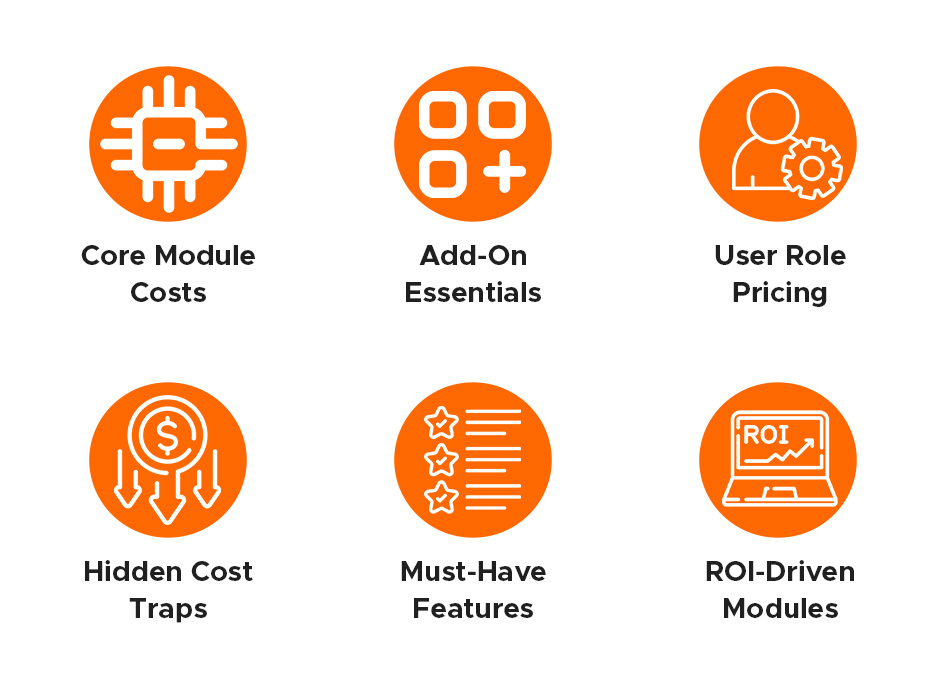
Think of NetSuite like a digital control center for your business—powerful, customizable, but only as cost-effective as the modules you choose. With every add-on impacting your budget, understanding NetSuite module pricing is more than number crunching; it’s about unlocking ROI and scaling smart. In this guide, you’ll discover which features are worth your money—and which ones might quietly drain your resources.
With a modular structure, NetSuite enables businesses to select and pay only for the capabilities they need. But the challenge lies in distinguishing the “must-haves” from the “nice-to-haves.” This guide dives deep into the value, structure, and smart selection of NetSuite modules to help you avoid overspending and underutilization.
NetSuite module pricing refers to the cost structure of Oracle NetSuite’s cloud-based ERP system, which is offered through a core platform with optional add-on modules. Businesses are billed based on the specific modules they choose, number of users, and license type.
Modules can be added at any time, giving businesses flexibility—but that also means pricing can quickly climb without clear planning.
Many companies underestimate the netsuite license cost due to unclear pricing tiers and hidden integration needs.
NetSuite offers over 30 modules grouped across operational domains. Here’s a snapshot:

Not every business needs every module. The value lies in choosing modules aligned with your business model, growth goals, and digital maturity. Below are the high-impact NetSuite modules worth considering:
Why it’s worth it: Foundational and mandatory for all implementations.
Best for: Companies with complex billing and revenue streams.
Best for: Product-based companies and retailers.
Why it’s valuable: Consolidates customer interactions across marketing, sales, and support.
Best for: B2B or B2C companies looking for an integrated web store.
Best for: Service firms and agencies.
Certain modules may add cost without delivering proportional value unless your business demands them:
While NetSuite module pricing is modular in theory, some features are interdependent, meaning you may need to buy multiple modules to unlock full functionality.
Pro Tip: Leverage netsuite integration services early to understand long-term compatibility and avoid costly post-deployment changes.
Smart module selection is only part of the puzzle. Integrating NetSuite with other critical systems (CRM, eCommerce platforms, BI tools) ensures seamless workflows.
Benefits of thoughtful netsuite integration services:
SoftArt offers tailored netsuite integration services that align with business-specific goals and systems—driving efficiency and ROI.
NetSuite’s modular approach empowers companies to build their ERP like a custom suit—tailored, scalable, and functional. However, the key lies in investing in modules that solve real problems, align with growth strategies, and offer tangible ROI.
Whether you’re just starting out or scaling into new markets, make every dollar of your NetSuite module pricing count by aligning features with outcomes. Avoid the bells and whistles unless they add real value.
Partnering with experienced advisors like SoftArt can ensure your NetSuite investment is not just tech-driven—but business-smart.
Frequently Asked Questions:
What is NetSuite module pricing?
Ans. NetSuite module pricing refers to the cost of individual add-on functionalities beyond the core platform, tailored to your business needs.
Which NetSuite modules are essential for a growing business?
Ans. Core Financials, CRM, and Inventory Management are often must-haves for scalability and efficiency.
Are NetSuite modules charged per user?
Ans. Yes, each module often has user-based pricing, depending on the type of access and role.
Can I add NetSuite modules later?
Ans. Absolutely. NetSuite is modular and allows you to add features as your business evolves.
How can I avoid overpaying for NetSuite?
Ans. Choose only what aligns with your operational needs, conduct annual reviews, and consult with NetSuite experts like SoftArt.
What hidden costs should I watch out for?
Ans. Integration, user licensing, and implementation support can add up quickly if not planned.
When it comes to cloud-based ERP solutions, NetSuite stands out for its scalability, adaptability, and ability to serve diverse industry needs. However, what often puzzles many decision-makers is how NetSuite pricing varies across different sectors like retail, manufacturing, and services. In this blog, we’ll break down how the pricing differs by industry and help you understand what factors influence the NetSuite license cost.
NetSuite doesn’t offer a one-size-fits-all solution. Instead, it tailors its pricing based on:
Let’s dive deeper into what NetSuite pricing for retail, manufacturing, and services really looks like and what you should expect when budgeting for your ERP transformation.
Retail businesses operate in a fast-paced environment that requires real-time inventory management, customer engagement, and seamless omnichannel integration. NetSuite’s retail solution includes modules like:
Key Cost Drivers:
Typical Pricing Range:
While prices can vary, NetSuite pricing for retail typically ranges from $999/month to $3,000/month depending on the number of users and modules required.
Manufacturers need ERP systems that can handle complex supply chains, bills of materials, production scheduling, and compliance tracking. NetSuite’s manufacturing edition includes:
Key Cost Drivers:
Typical Pricing Range:
NetSuite pricing for manufacturing usually falls between $1,200/month to $4,000/month, based on user count and depth of customization.
Service-based organizations like consulting firms, marketing agencies, or IT companies rely on project management, resource planning, and financial tracking. NetSuite offers dedicated features for:
Key Cost Drivers:
Typical Pricing Range:
NetSuite pricing for services is generally between $900/month to $2,500/month, depending on the number of users and project scale.
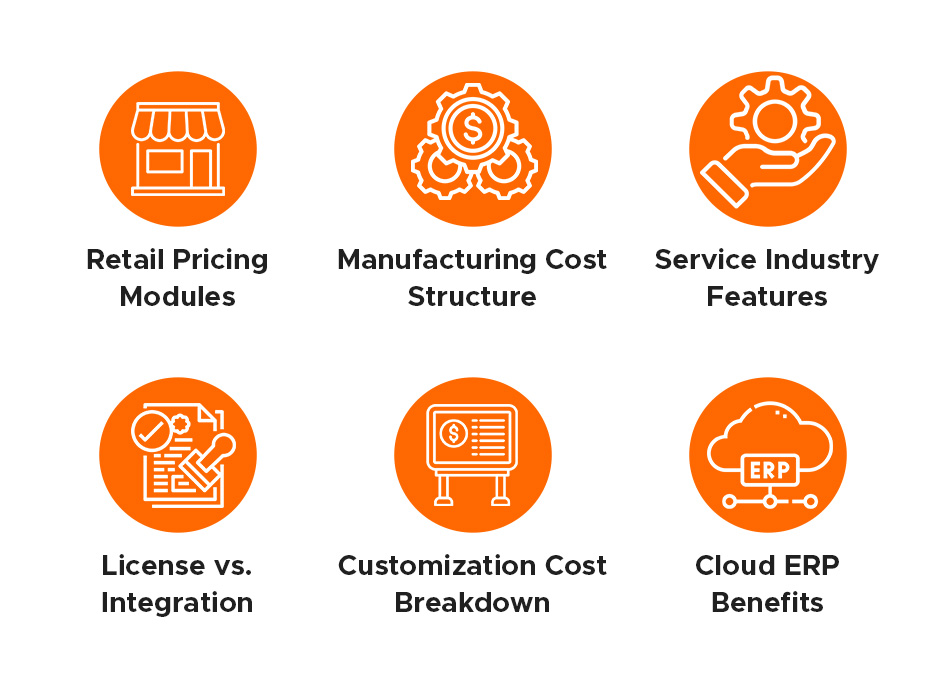
The NetSuite license cost is influenced by several standard and industry-specific factors:
NetSuite’s pricing structure is subscription-based and user-tiered. Each type of user (full user, employee user, etc.) is charged differently.
Each module adds functionality—and cost. Some commonly used ones across industries include:
Besides the annual license, implementation involves configuration, data migration, testing, and training. These are usually charged upfront or hourly.
For many companies, NetSuite needs to connect with external systems (e.g., CRMs, e-commerce platforms, supply chain tools). The cost of NetSuite integration services varies based on the complexity of the connections needed.
| Industry | Monthly Cost Range | Key Modules | Customization Level |
|---|---|---|---|
| Retail | $999 – $3,000 | POS, CRM, Inventory, E-Commerce | Medium to High |
| Manufacturing | $1,200 – $4,000 | BOM, SCM, Production Planning | High |
| Services | $900 – $2,500 | Project Mgmt, Time Tracking, Billing | Medium |
When evaluating NetSuite, always:
It’s a good idea to create a NetSuite pricing checklist based on your business model and growth trajectory.
Regardless of the industry, maximizing ROI from NetSuite depends on:
Remember, the total cost isn’t just about the software—it’s about implementation, usability, and long-term scalability.
Whether you’re in retail, manufacturing, or services, understanding the nuances of NetSuite pricing is crucial. While it may seem expensive upfront, the system’s scalability and long-term benefits often justify the investment.
If you’re serious about adopting NetSuite, ensure you:
With a clear understanding of costs and expectations, you’ll be better positioned to leverage NetSuite for operational efficiency and business growth.
For tailored insights and professional support, SoftArt is here to help you navigate your NetSuite journey.
Now that you’ve got a complete breakdown of NetSuite pricing for retail, manufacturing, and services, the next step is to evaluate your business needs and plan accordingly. If you’re looking for a partner to simplify your ERP transition with accurate pricing estimates, trusted implementation, and smooth NetSuite integration services, consider reaching out to experts with years of real-world experience.
At SoftArt, we’ve helped organizations across industries optimize their ERP investments. Let’s talk about how we can do the same for you.
What factors influence NetSuite pricing across industries?
Ans. NetSuite’s pricing model is not one-size-fits-all. It varies based on multiple elements, such as the number of users, types of modules required, business size, and industry-specific configurations. For example, a retail company might need point-of-sale and eCommerce integrations, while a manufacturer may require production planning and warehouse management. Additionally, costs can increase with the level of customization, training, and netsuite integration services required to align the platform with your operations.
How does NetSuite pricing differ for retail and manufacturing businesses?
Ans. NetSuite pricing for retail often revolves around modules like inventory control, order management, CRM, and multi-channel commerce tools that support both online and offline sales. On the other hand, NetSuite pricing for manufacturing includes production management, supply chain automation, bill of materials, and demand forecasting. The functional differences lead to a distinct pricing structure, where each industry pays for the tools essential to its processes. Retail might focus more on customer engagement, while manufacturing prioritizes operational efficiency.
Are there additional costs involved beyond the NetSuite license fee?
Ans. Yes, while the NetSuite license cost forms the base of your investment, additional expenses should be expected. These include implementation charges, user training, data migration, and technical support. Businesses also often require custom configurations or third-party app integrations, which fall under netsuite integration services. Over time, ongoing maintenance, upgrades, and possible re-customizations can also add to the total cost of ownership.
How is NetSuite pricing structured for service-based industries?
Ans. NetSuite pricing for services businesses is typically focused on project-based modules like time tracking, billing, resource management, and client communication. Companies in consulting, legal, IT, and creative fields can benefit from features that help manage billable hours, allocate staff efficiently, and track project performance. The pricing for this vertical is generally more user-driven, as it’s based on the number of consultants and projects managed through the platform.
What is the average NetSuite license cost for small to mid-sized businesses?
Ans. The NetSuite license cost starts at approximately $999 per month for the base platform, with an additional $99 per user per month. However, this is just the starting point. Your final pricing depends on the number of users, modules selected, required customizations, and industry. Many small to mid-sized businesses find that total monthly costs can range from a few thousand dollars to more, depending on scale and complexity. It’s best to get a personalized quote that reflects your specific business needs.
Is NetSuite on your consideration list, but you are concerned about the pricing? You’re not alone! NetSuite pricing is not one-size-fits-all and can seem tricky, since it depends heavily on the number of users, required modules, customizations or integrations. Add-ons and Suiteapps subscriptions can also add to your expense, and without knowing your unique needs it’s impossible to give you an exact price. Whether you’re calculating NetSuite licences cost or Netsuite Implementation cost, understanding the key factors will help you make an informed decision.
Before diving into any sort of analysis of NetSuite licensing costs, it is important to understand the differences between full user licenses, employee licenses, and role-based pricing. That’s why, we’re breaking down those pricing pieces and giving you general rules of thumb to inform your estimates with confidence.
Planning your NetSuite deployment? Understanding its pricing is just as important. Explore our simplified 3-step guide to NetSuite Pricing & Licensing and make budgeting hassle-free.
With a clear understanding of NetSuite’s pricing structure—from core packages to user licenses and add-on modules—you can plan smarter and invest more confidently. Choose what fits your business today and scale effortlessly.
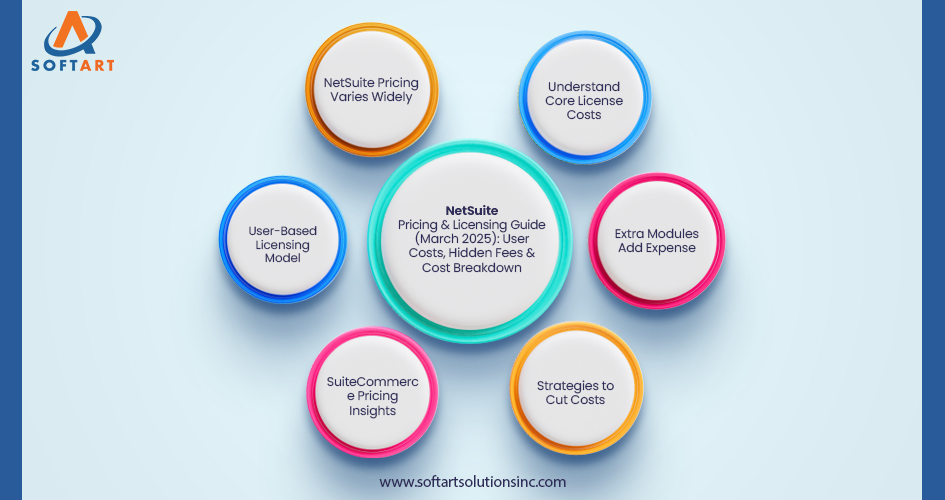
Understanding NetSuite’s cost per user is crucial for controlling expenses and providing employees with suitable access. NetSuite operates on a named user basis, meaning every person needing system access must have their own individual license.
The edition of NetSuite your business requires depends on the number of full user licenses you need. By evaluating Oracle NetSuite pricing carefully, you can optimize costs and choose the most suitable package.
NetSuite does not have a specific read-only user option. Employees who need to see reports or dashboards require a full user license.
However, NetSuite supports scheduling automated report distribution. Employees with full licenses can arrange for reports to be emailed regularly in formats like Excel, CSV, or PDF, allowing non-licensed users to access information without needing additional licenses.
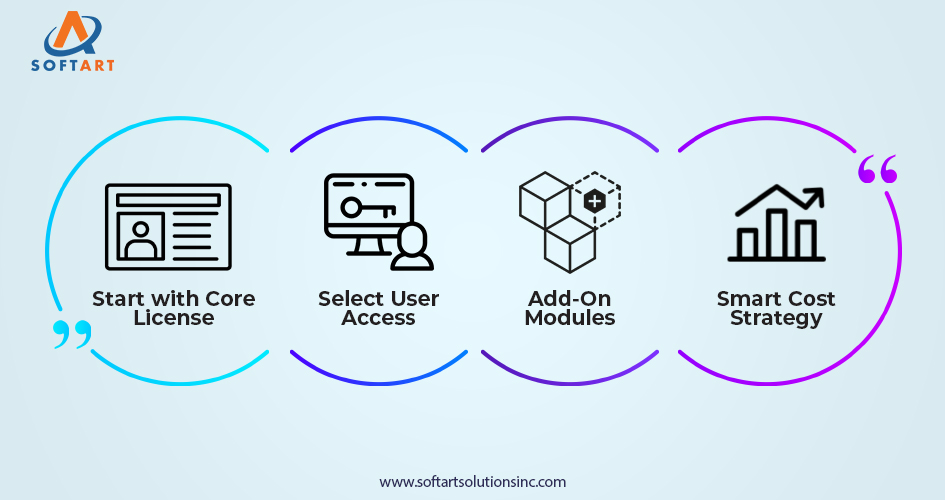
Apart from licensing fees, implementing NetSuite itself represents a significant investment. Setting up NetSuite goes beyond simply buying the software—it involves system configuration, customization, data transfer, and employee training. Implementation expenses can differ significantly, often ranging from $10,000 to over $100,000, depending on the complexity and level of customization needed for your business. Choosing the right NetSuite implementation partners can also impact the overall cost and success of the deployment.
After the initial setup, continuous support and training become essential. NetSuite offers various customer support options, with costs based on the service level you choose. Companies needing specialized support or regular staff training should plan for these expenses, as they increase the overall cost. Additionally, businesses often look into NetSuite integration services to connect NetSuite with other business applications, which may involve extra fees.
Several factors determine the total cost of a NetSuite deployment, making every project unique. The size and complexity of your business play critical roles—larger organizations or those with complex, customized operations typically require more licenses and advanced functionalities, resulting in higher costs. For businesses estimating the NetSuite cost per user or the NetSuite total monthly subscription cost, understanding the scope of your needs is essential. Additionally, extensive system customizations and integrations with other software applications can lead to extra development charges.
Contract terms can also impact your expenses. Although NetSuite typically uses annual agreements, businesses committing to longer-term contracts or package deals may qualify for discounts. Estimating how much does NetSuite cost per year is crucial for accurate budgeting and long-term planning. Oracle NetSuite pricing is flexible, allowing organizations to adjust user licenses and module choices as their business requirements change.
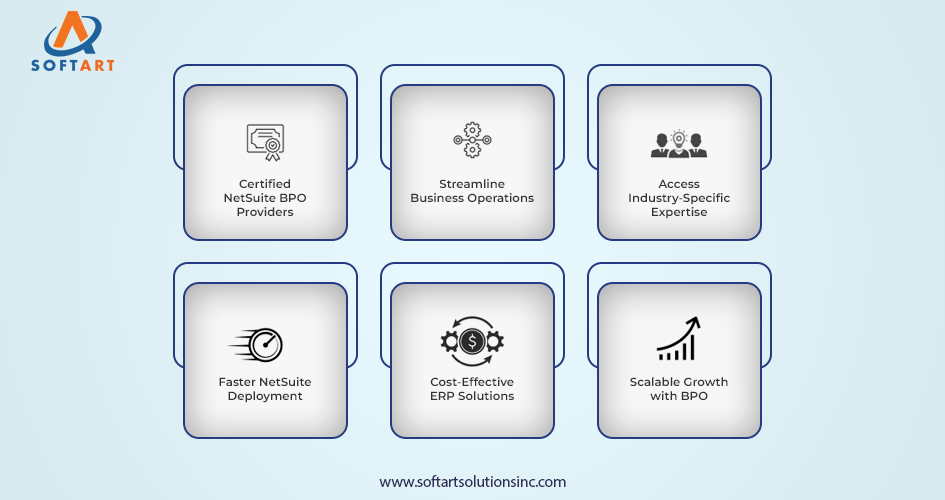
NetSuite’s BPO program is designed for accounting firms that offer NetSuite software combined with ongoing accounting services for a simple monthly fee. This solution is perfect for small, growing businesses not ready to build their own finance and accounting teams.
The pricing model and planned price hikes. There isn’t a fixed “menu price” during the sales discussion. Instead, you have to spend days analyzing details with sales representatives to figure out the cost. Although this approach makes sense from a business perspective, it becomes difficult to determine whether the pricing is based on your actual requirements or simply on what you can afford. Moreover, the automatic price rise after contract expiration is frustrating. Even if your business remains the same, the ERP cost will increase regardless.
Moreover, the automatic price rise after contract expiration is frustrating. Even if your business remains the same, the ERP cost will increase regardless. For businesses relying on Oracle NetSuite pricing, this unpredictability can make financial planning challenging.
On the downside, using BPO partners might limit your ability to customize NetSuite fully, making it difficult to use the more advanced features. Engaging with the right NetSuite implementation partners or opting for NetSuite integration services can sometimes mitigate these limitations, offering more flexibility in configuration and customization.
Best Fit: Small companies with strong funding that aim for quick growth. Not Recommended: Businesses that want extensive customization from NetSuite.
Pros:
Cons:
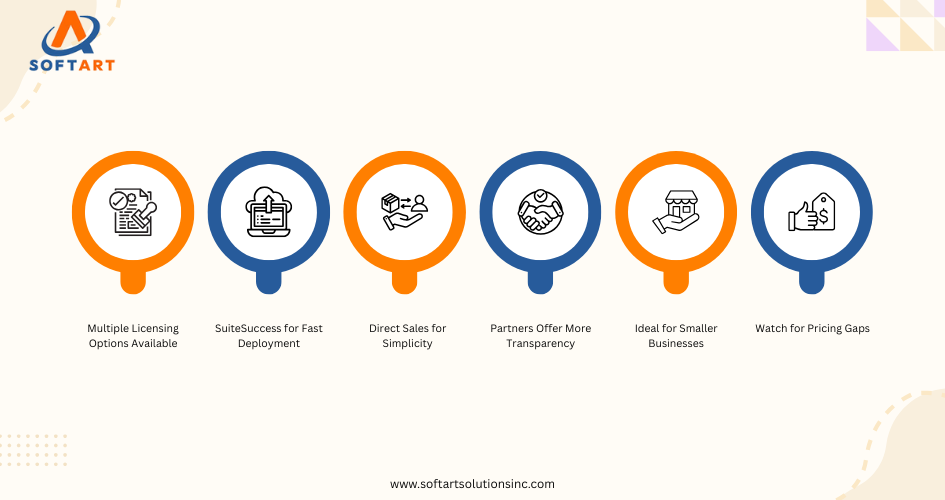
If you’re considering NetSuite for the first time, you might think contacting NetSuite directly is the simplest way to find out its price. But NetSuite has multiple licensing choices, each with its own benefits and limitations.
In this section, we’ll clearly explain these licensing choices to help you decide the most suitable option for your specific requirements.
NetSuite has its own sales team, specialized in various industries and dedicated to helping businesses adopt their ERP solutions. They offer professional services through their SuiteSuccess method, designed to get your system up and running in approximately 100 days. While SuiteSuccess is ideal for more straightforward businesses and certain industries, it might not suit larger companies that have complex or unique needs.
Choosing NetSuite’s direct sales channel gives you a direct relationship with the software provider, which is beneficial for SME companies who need only SuiteSuccess-like packages. However for the large companies and multiple country implementations, estimating the NetSuite cost per user and NetSuite cost per month can be challenging through the direct sales channel, as some customers find the pricing unclear and feel the direct sales team may lack detailed consulting experience. In such cases, working with NetSuite implementation partners can provide more transparency and guidance.
Best Fit: Smaller businesses or companies with standard industry needs. Not Recommended: Large companies needing extensive customization or integration.
Pros:
Cons:
Customer Feedback from G2

NetSuite Solution Providers are officially recognized consulting companies with a wide range of experience. They help new ERP buyers evaluate if Oracle NetSuite suits their business needs and requirements. These providers also create customized solutions combining software setup, personalized adjustments, and consulting support.
Working with a NetSuite Solution Provider means you gain access to experts who are knowledgeable about NetSuite and independent ERP advisors who focus on your business goals. This often results in better deals and pricing for your NetSuite subscription and ensures your provider prioritizes your company’s best interests. Additionally, they can assist with NetSuite integration services to seamlessly connect your ERP system with other business applications.
Solution Providers offer adaptable implementation processes and continuous support, serving as your single point of contact throughout your NetSuite journey—from the initial evaluation to ongoing support after implementation.
Best Fit: Businesses looking for a complete package including licensing, setup, custom solutions, and continuous support. If you prefer dealing with one accountable partner, this choice is perfect for you.
Not Recommended: Companies wanting to deal directly and exclusively with their ERP vendor.
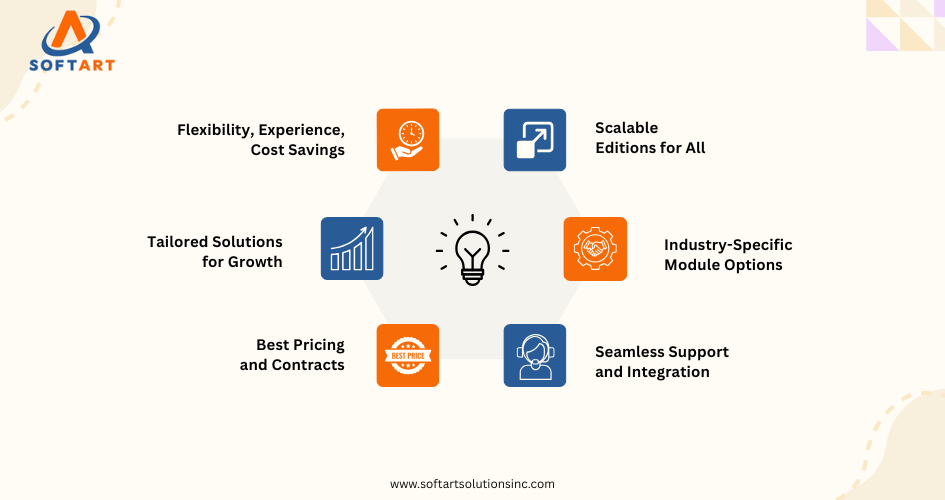
Pros:
Cons:
Selecting the best licensing option is key to getting the most from your NetSuite investment.
Here’s a clear comparison of your three choices:
| Option | Ideal For | Main Benefits | Potential Drawbacks |
|---|---|---|---|
| Netsuite Direct Sales Team | Businesses with simple requirements or extensive global operations | Seamless connection to NetSuite with a well-organized sales process | Limited adaptability and pricing clarity issues. Dealing with multiple contacts may lead to inconsistencies. |
| Netsuite BPO Partners | Growing small businesses lacking an internal accounting team | Integrates software and accounting solutions into one, streamlining vendor management | Reduced flexibility for customization. Shifting to in-house accounting could require a complete overhaul. |
| Netsuite Solution Provider Partner | Companies needing customized solutions, adaptability, and cost-effectiveness | Direct access to skilled consultants, tailored implementation plans, and a single point of contact throughout the process | Demands careful partner selection to ensure credibility. Some features may still depend on NetSuite resources. |
Although each option has its advantages, NetSuite Solution Provider Partners offer the best mix of flexibility, experience, and cost savings.
For companies aiming to maximize their return on investment, simplify implementation, and guarantee success, choosing a NetSuite Solution Provider Partner is the smartest decision.
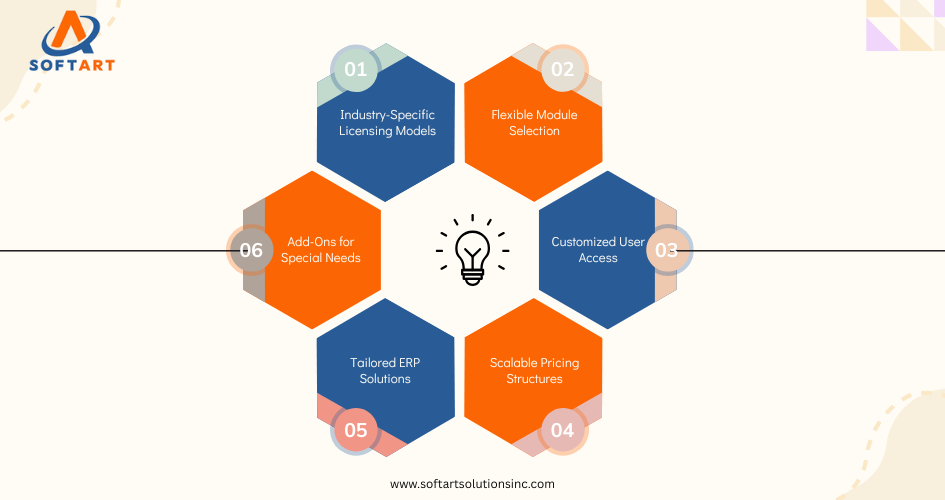
Unlike niche ERP systems built for specific industries, NetSuite stands out with its flexible architecture that caters to a wide range of industries, business sizes, and departments. From small startups to large global enterprises, NetSuite offers scalable solutions with pricing tailored to diverse operational needs. Whether you’re a lean accounting team in eCommerce or a multinational manufacturer, NetSuite’s licensing packages are designed to fit your industry, with transparent pricing that helps you plan effectively.
Built on a unified platform and hosted securely in Oracle’s cloud, NetSuite grows with your business—eliminating the need for disruptive upgrades. For companies seeking more than just basic ERP or CRM functions, NetSuite also provides a wide array of add-on modules and industry-specific bundles. These can enhance everything from financial reporting to supply chain management, making NetSuite a powerful, adaptable tool for long-term business success.
Choosing the Right NetSuite Edition NetSuite provides different editions based on the size and complexity of your business. The right option depends on your number of users, business structure, and specific needs. Working with reliable NetSuite implementation partners ensures you get the most suitable edition and seamless integration into your existing business processes. From setup to maintenance, these partners help maximize the value of your NetSuite investment.
Here’s a clear overview of each edition:
Best for: Small businesses and startups (minimum 8 users)
Estimated Cost: $20,000–$65,000 per year
Designed for businesses new to ERP systems, offering:
Best for: Growing small-to-medium businesses (up to 30 users)
Estimated Cost: $35,000–$85,000 per year
Suited for businesses needing extra features:
Best for: Medium-sized companies with multiple entities
Estimated Cost: $35,000–$125,000 per year
Great for businesses with more complex structures, offering:
Best for: Large organizations with over 1,000 users
Estimated Cost: $250,000+ per year
Provides advanced capabilities, including:
In addition to basic ERP and CRM tools, NetSuite provides numerous optional modules that you can purchase separately or as part of a specialized industry package. These modules offer advanced features designed specifically for unique business requirements, enabling you to adapt your NetSuite solution to your company’s evolving needs.
NetSuite’s SuiteSuccess is a pre-configured, industry-specific package designed for faster implementation and quicker ROI. It combines best practices, role-based dashboards, and a phased rollout approach to help businesses go live in as little as 100 days—ideal for companies looking for a streamlined ERP setup with minimal customization.
Prices for NetSuite modules depend on their complexity and your industry needs. Typically, these modules cost between $599 and $1,699 monthly per module. You can add modules whenever necessary, but they can only be removed at the time of your subscription renewal.
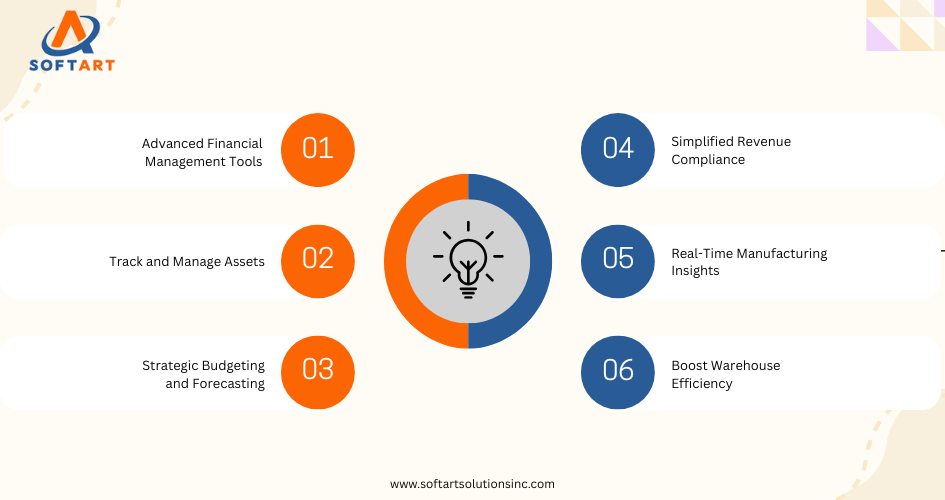
| Module | Key Features |
|---|---|
| Advance Financials |
|
| Fixed Assets |
|
| Budgeting & Planning |
|
| Revenue Recognition |
|
| Manufacturing (WIP & Routing) |
|
| Warehouse Management (WMS) |
|
| Project Management |
|
| SuiteCommerce (Ecommerce) |
|
NetSuite modules can scale according to your business needs. Unlike traditional ERP systems that require long-term, inflexible contracts. Modules can be added anytime but removed only at renewal. This flexibility makes it easier to manage NetSuite cost per month as your business requirements evolve.
Thousands of businesses trust NetSuite—want to know how much does NetSuite cost per year for your company? Use our quick pricing tool to instantly get an estimate covering software, setup, and ongoing support from an authorized NetSuite Solution Provider. Whether you need NetSuite integration services or support from NetSuite implementation partners, getting an accurate cost breakdown ensures you stay within budget.
In general, NetSuite implementation costs companies somewhere between $25,000 to $100,000 or more. But what explains such a range?
The cost covers system configuration per the business workflows, the integration of NetSuite with existing platforms, and customization according to the organization’s requirements. Multiple system integrations and a high degree of customization dictate the overall cost.
Here are is what which is covered in the implementation cost from the Netsuite partners

Define Your Goals: Clearly defining your goals for NetSuite makes for a smoother implementation, and will help you avoid wasting resources.
Leverage Built-in Functionality: Explore comprehensive standard capabilities that NetSuite offers before you think of customization. However, there are plenty of businesses that feel like these out-of-the-box solutions satisfy 100% of their needs.
Work with the Right People: Having an experienced NetSuite partner familiar with your industry will customize your solutions quickly and save you expensive customizations.
While there’s no one-size-fits-all calculation for NetSuite implementation costs, there are information on how to optimize your investment — and we want to help.
| Cost Components | Estimated Expenses | Billing Frequency |
|---|---|---|
| Software Licensing Fee | $1,000 to $100,000+ | Yearly |
| Advanced Features Cost | $1,799 to $599 | Yearly |
| Implementation Expenses | $25,000 – $100,000+ | One-time setup |
| Customization Charges | $50–$110 per hour | On-demand |
| Integration Expenses | $0–$3,000+ | One-time setup + Annual upkeep |
| Training & Support Fees | $2,500 – $15,000 | As Required |
Understanding the costs associated with NetSuite integration and implementation is crucial for making informed decisions that align with your business needs. While costs can vary, proper planning, leveraging built-in functionalities, and working with the right partners can ensure a smooth implementation and optimal return on investment.
Ready to get started? Maximize your NetSuite ROI with a tailored plan today!
Avoiding pitfalls and missteps in NetSuite licensing, especially as more businesses turn to cloud technology for their ERP solutions, is easier with a NetSuite Solution Provider partner that you can work with. Licensing is their business, so they have insights that buyers might miss.
One major misconception is that NetSuite licenses will be able to be renegotiated when the subscription period expires. But what is vital to understand is that your original software agreement defines everything that comes next with renewals. *This applies to an existing contract, which inherits the terms of the original Subscription Software Agreement (SSA) and license estimate.
To avoid surprise expenses later, it’s important to do it right from the get-go. By working with an expert such as SoftArt, the commercial licensing process is simple without any surprises down the line.

When acquiring any major asset — a piece of software or a piece of furniture, for example, or a car — timing is as important as the product itself. This may be second nature for retail, but it is just as important in enterprise software purchases.
Big publicly traded software players like Oracle, Salesforce and Microsoft are under enormous pressure every month and quarter to hit sales targets. In the run-up to financial reporting deadlines, they are much more focused on closing deals to achieve their numbers. This dynamic could play to your advantage, because buyers are frequently in a better negotiating position at the end of a month or quarter.
That said, the last business day of the fiscal calendar is the absolute best time to negotiate for a new software deal. Management is desperate to seal bargains, so rural reflects willing to stretch whilst it comes to pricing/getting an offer which means that you may fit jointly with a deal with an incentive for a lower price. That gives buyers an opportunity to seize the day and get a good deal.
Planning when to purchase your license is important in order to maximize your NetSuite purchase. If you time your purchase to line up with your organization’s deadlines and the software provider’s fiscal calendar, significant cost and ROI can be achieved on your NetSuite implementation. But remember timing is key!
Pros and Cons of NetSuite’s Subscription-Based Software Model. It offers flexibility and spare capital, when compared to traditional perpetual software acquisitions. However, migrating from one Enterprise Resource Planning (ERP) system to another is an intricate process. NetSuite knows this challenge very well.
Okay, how does this relate to saved NetSuite licensing costs? One common strategy touted by Software as a Service (SaaS) vendors, including NetSuite, is the heavy initial discount to drive new customers, only to raise the price during the following years when their product is maybe seen as truly expensive while their services become increasingly valuable. As your perceived value increases, likewise does your subscription fee. This can lead to rising software spend over time.
So, what are your options? Should you switch vendors, begrudgingly pay the renewal fee, or spend hours negotiating with NetSuite management for a better deal than your #registeruser? Each of the options incurs its own cost in time and money.
This process requires a meticulous evaluation of your options for your NetSuite renewal, because if you don’t make an informed decision, not only could you end up paying more over time; you also could miss out on what might give your business a better competitive edge. Consider the possible rising costs in the long run, and assess if the pros of continuing to use NetSuite are better than the cons. This approach also has the added advantage of allowing you to be better positioned to know your options and maximize your NetSuite licensing savings.

Some first-time buyers of NetSuite think that they will get a better deal by purchasing all licenses at once. But the most important aspect of NetSuite’s pricing model is its flexibility—it helps businesses scale, adding users and functionality only as and when necessary—as an industry on-demand service.
If your target audience requires a larger license here and there, it can be justified to buy a larger package with a discountHowever, the most cost-effective solution is to buy new licenses gradually so the business evolves. This approach frequently results in a larger long-range savings on NetSuite licensing.
Again and again, we’ve heard about new NetSuite customers buying Modules (and Services) they don’t need while thinking they had a special deal — only to learn later on that those features weren’t necessary for how they do business.
Knowing what licenses to activate and when can make a big difference in your NetSuite spending. An incremental, strategic approach to licensing helps you realize all the value of the platform without sacrificing value for cost.
Don’t make assumptions—ask a NetSuite Solution Provider to help up uncover pricing insights.

Similar to other SaaS solutions, NetSuite employs a subscription-based licensing system with options for flexible contract terms. The minimum commitment is typically 12 months, but most businesses sign multi-year agreements (3 to 5 years is common) that ensure that the enterprise is aligned with their operational needs.
For businesses, choosing a longer subscription term also helps lock that pricing in—giving them cost certainty and protecting them from sudden price hikes come renewal time. The only way this remains affordable is if a fixed pricing cap can be secured as part of the initial contract to guard against unexpected raises down the road.
Industry expert NetSuite solution provider SoftArt understands that the duration of contracts and payment structures need to fit your unique business model when looking for financial flexibility. Moreover, you might consider finance options to wrap up software licensing and implementation costs into a monthly structured payment plan. This way, businesses can better manage NetSuite cost per user, NetSuite cost per month, and even anticipate how much NetSuite cost per year.
Though NetSuite allows flexible length subscriptions, locking in a longer-term contract with price protections helps businesses budget better for their software costs. A trusted NetSuite implementation partner can provide you with a structured and cost-effective approach to scalability with a financial strategy in mind. Additionally, businesses can leverage NetSuite integration services to seamlessly connect their existing systems while keeping an eye on Oracle NetSuite pricing for optimal investment.
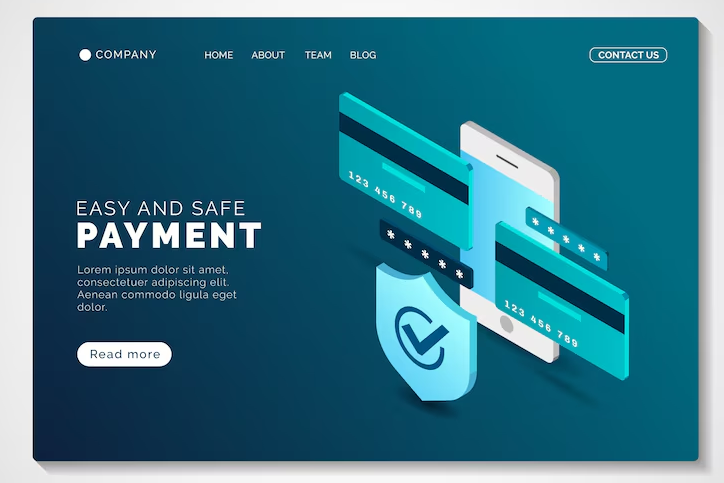
So, it’s important to consider how Oracle NetSuite pricing stacks against other top ERP solution platforms to critically handle the business function. Below, we review the pricing structures of some of NetSuite’s main rivals and how they compare.
Pricing Information For SAP Business One
SAP Business One has two deployment models that are on-premises and cloud-based, which have different cost implications.
On-Premises Deployment: One-time license fee of $3,213 per named user + Annual Maintenance Costs
Cloud-Based Deployment: Starts at $94/user/month
There are a number of factors to consider when looking at SAP Business One vs. NetSuite:
By recognizing how these modules stack, and the long-range financial impact they can have on an ERP system, businesses can determine which system will best match their budget, scale, and operational goals.
Each Microsoft Dynamics module is separate from the other modules, and businesses can choose which modules are needed and pay only for those modules while avoiding the features that will go unused. Pricing for core ERP modules starts at $40 per user per month, with optional modules available separately, including: CRM and Supply Chain Management. This modular structure can be cost-effective for enterprises with niche requirements, but additional costs may increase the overall rate as more modules are added.
One significant advantage of Dynamics 365 is its seamless integration with Microsoft’s ecosystem, potentially lowering implementation costs for businesses already using Microsoft products. Although the software of Dynamics Business Central is cheaper than NetSuite, implementation costs can be up to three times higher. This further reinforces the need to consider not just the initial costs, but the ongoing economic effects in choosing an ERP system. Engaging with NetSuite implementation partners can streamline the process and mitigate costs associated with complex setups.

Sage Intacct is a subscription-based financial management system. The base plan for small teams is around $400 per month and each module has its own price based on what your business needs.
Sage Intacct offers greater affordability than NetSuite for small and medium-sized enterprises (SMEs) in need of advanced financial management software. However, there may be limited advanced features outside of core accounting, leading businesses to invest in additional solutions. This can ultimately increase the NetSuite total monthly subscription cost when businesses realize the need for comprehensive tools that NetSuite inherently provides.
Moreover, NetSuite integration services ensure that various business processes are streamlined, helping reduce operational costs while improving system efficiency. Despite Sage Intacct being an excellent option for businesses in the growth stage, it might face scalability challenges, which can raise costs as operational requirements grow—something that Oracle NetSuite pricing takes into account with scalable and modular solutions.

NetSuite TCO (Total Cost of Ownership) encompasses all direct and indirect costs associated with deployment and maintenance of the ERP solution over its entire lifespan, typically 3–7 years. Understanding these financial aspects is crucial for sound investment decisions and achieving long-run performances.
Subscription Charges:
NetSuite offers subscription-based pricing that varies based on the number of users, chosen modules, and any additional features like extra storage. The more users and modules, the greater the subscription fees. To make long-term commitments enticing, NetSuite typically discounts its contracts which often run between three and five years.
Implementation Expenses:
The initial setup costs include a good amount of payment providing you with consulting, data migration, system integration, customization, and training with NetSuite. Several consulting services are critical to help you rollout, set up the system, and give you advice from people with practical experience. Data migration is priced separately (it depends on the data volume and quality), and integration costs are charged according to the number and complexity of systems integrated. Customization to customize the platform to meet exact business requirements also increases costs. Seamless user adoption relies on extensive training workshops for both end-user and admins.
Subscription and Licensing Fees:
As the company grows it may demand additional modules or users to access the platform, and businesses are charged continual fees that they must pay to keep using NetSuite. Under the Software-as-a-Service (SaaS) model, subscription costs also frequently rise over time.
System Maintenance And Updates
NetSuite periodically releases new features and system updates, most of which are bundled into the subscription package. But companies could incur additional costs for testing and verifying updates will work now, especially if the updates affect customizations. Furthermore, when new features or changes to the interface are introduced, additional training may be necessary to maintain developers’ proficiency.
Support for Customers and Training Programs:
This means to keep running smoothly — ongoing support from NetSuite or a certified partner is key. NetSuite has several tiers of support plans, which can get pricey for premium. Moreover, constant training for new team members along with advanced training for current employees is essential to keep up with productivity and efficiency.
Maintenance of integration and customization
Integrating NetSuite with other software systems and ensuring these integrations operate smoothly can be an ongoing cost. Over time, as business processes change, the existing customizations may need to be enhanced or redeveloped and this would further result in development effort re-investment.
In-House Resources:
To efficiently manage tNetSuite, internal team members need to be allocated for system administration, business process optimization, and change management. Having these dedicated resources helps to ensure that the platform is being utilized optimally and the most value is derived from it.
Possible Downtime and Disruptions:
Transitioning to the NetSuite platform may result in temporary efficiencies and significant disruptions to normal business activities. Imperfect response during data migration or system setup could easily result in errors that must be corrected so that everything is perfect.
Lost Opportunities:
Neglecting to fully integrate an ERP will result in lost efficiency, unrecognized revenue, and an absence of competitive advantage. However, continued reliance on manual processes and disparate data management will undermine operational effectiveness and stall strategic decision making.
Advanced Assistance Options for NetSuite Costs
Following NetSuite’s native Advanced Customer Support (ACS) service, ContinuedSuccess is another kind of support solution available for you to add to your NetSuite arsenal to maximize your investment. Continued Success provides complete coverage, targeting technical, functional and strategic needs with a variety of customizable support plans. In contrast to ACS with its best annual contract, ContinuedSuccess has a flexible pricing plan with definable quarterly subscriptions defining fixed support hour packages. By being dynamic and adaptable, this highly scalable model gives businesses the flexibility to design their level of support based on on-demand usage patterns, unlike ACS’s mandated long-term commitment and capacity restrictions.
Through a comprehensive assessment and consideration of each of these cost factors, organizations can aggregate a detailed NetSuite Total Cost of Ownership (TCO) analysis. By providing such a detailed and total assessment, accurate budgeting and financial planning become possible, enabling organisations to carry out the NetSuite investments that drive sustainable long-term operational success, in keeping with overall strategy.

Additionally, there are various subscription plans provided by NetSuite to suit distinct business needs and budget strategies. Businesses can also opt for annual plans, which automatically renew each 12 months, or even long-term plans for three or five years. Annual plans allow for periodic reassessing of budgets, while multi-year contracts typically offer savings and more cost predictability. The payment plans offered are also flexible, so operators can either make a one-time payment up-front for the full period, or pay monthly or quarterly, which great for cash flow management.
Now, for renewal practices, NetSuite is concerned with service continuity and helping businesses manage their ERP costs. Subscriptions are typically on auto-renew by default unless you cancel in advance — which usually means giving notice within a certain time period (for example, 90 days before your renewal). Be careful that you are not facing any price increases upon renewal, and it is recommended to negotiate price caps during the original signing so as not to face increases that were not expected.
For finalization of its subscription, companies can also negotiate across the terms and conditions like commitment to service, price limits, customization, and add-on features to keep their agreement relevant as their business grows. Collaborating with NetSuite implementation partners can help streamline the renewal process and ensure that the most cost-effective strategies are in place.

Knowing cancellation and termination policies upfront can help you integrate changes in strategy successfully. That means understanding any penalties for early termination and building a plan for interim supporting measures if moving to another ERP solution. With proper assessment and negotiation of these items, organizations can maximize their NetSuite investment. In conclusion, step by step costs can be successfully managed through preparing for renewals, exploring the much needed payment alternatives and breathing in the recent cancellation rules to be prepared for these outlined steps above.
Q: How much does NetSuite cost per user on average?
Q: Although the model is heavily based on per-user pricing, the total investment will depend on the number of users, what features are needed, and how it fits within the larger business context.
Q: Do you offer special pricing for nonprofits or educational institutions?
A: Yes, NetSuite provides registered 501(c)(3) non-profit organizations with meaningful discounts through NetSuite Social Impact, with savings of up to 100% on licensing fees.
Q: What are the major influencing factors for NetSuite implementation cost?
A: Implementation costs depend on several factors, including the number of modules to be configured, the degree of customization and integration needed, the complexity of the data migration, and the third-party services required from the NetSuite implementation partner. Generally, implementation costs are between $25,000 and $150,000 or more based on the project timeline and complexity.
Q: Are there any low-cost or free options to try NetSuite?
A: Unfortunately NetSuite doesn’t offer any free trials
Q: How much does NetSuite customization cost?
A: Customization of NetSuite altogether costs anywhere between $50 to $100 per hour, based on the complexity of customization and expertise of the service provider used in the methodization.
Q: Is NetSuite in the small business budget?
A: Yes, small businesses can definitely fit NetSuite into their budget. NetSuite provides starter bundles specifically catered to the needs of small businesses. Comprising the necessary features at a decent price, these packages are extremely accessible. Moreover, built to scale, as businesses grow, they can scale their NetSuite capabilities with them giving them peace of mind for long-term flexibility and value.
Q: How to Reduce NetSuite Licensing Cost?
A: If you want to save some money on NetSuite licensing costs, purchasing in alignment with the NetSuite fiscal year can generally provide some additional discount opportunities for you. In addition, thoroughly evaluate your immediate needs and select a plan that aligns with your current requirements, and committee to growth as you grow, rather than invest heavily upfront.
Q: What subscription plans and payment models are available for NetSuite?
A: NetSuite gives clients a choice of subscription periods from one to five years, which has the benefit of consistent pricing and predictability in calculating costs. In addition, payment plans can be customized with a NetSuite provider, so software licensing and associated service contracts can be combined into a single monthly installment plan for simple management.
Q: What other support options for NetSuite exist in addition to Netsuite advanced customer support (ACS) program?
A: Yes, there are external support solutions such as Continued Success that certainly have much more flexible and customizable support plans than Netsuite’s ACS program. These third-party offerings include tailored quarterly subscriptions and support hour banks for all-around technical, functional, and strategic help.
Having the right ERP system in place can help companies looking to scale efficiently. Stuck in the Sage Intacct vs. NetSuite pull? You’re not alone! Both platforms are strong cloud-based finance management solutions, but choosing the right one comes down to your business’s individual needs.
Given the abundance of Sage Intacct competitors available in the marketplace, understanding which option is right for you is critical to preventing an expensive misstep. Additionally, when considering ERP options, evaluating Oracle NetSuite pricing and choosing the right NetSuite implementation partners can significantly impact your decision-making process. In this guide, we will analyze the critical differences, features, pricing, and real-world user insights to help you confidently decide which is the best ERP in 2025. Let’s dive in!
Hence, demonstrating how the business accounting software development market is so much alike yet so different.
NetSuite and Sage Intacct are both cloud-native financial management solutions designed for companies that have outgrown entry-level solutions like QuickBooks, Zoho, Tally or Xero.
They are modern multi-tenant cloud platforms that provide real-time updates, AI-driven automation, and built-in compliance features for rapid business scaling. Partnering with a reliable NetSuite integration firm can ensure a smooth and efficient transition to leveraging these advanced features.
NetSuite and Sage Intacct are built for scaling mid-sized businesses and enterprises, empowering finance teams to easily automate and reduce manual legwork while allowing for more in-depth financial visibility.
NetSuite provides an end-to-end ERP solution combining finance, human resources, supply chain, inventory, order management, procurement, professional services automation, and eCommerce. On the other hand, while Sage Intacct focuses on financial management, it lacks robust order and inventory capabilities.
When evaluating Oracle NetSuite pricing, businesses should consider the added value of its comprehensive features compared to. Additionally, working with experienced NetSuite implementation partners can further enhance the efficiency of adopting this all-in-one solution.
NetSuite offers a more comprehensive solution for businesses looking for a “one system” solution beyond finance. Sage Intacct, on the other hand is a good option for organizations that only need accounting and financial reporting.
Why this matters: NetSuite offers organizations a complete software solution for long-term scalability without the need for several stand-alone software solutions. This is especially beneficial when partnering with a reputable NetSuite integration firm to ensure seamless deployment and integration.
Which brings me to Sage Intacct, which provides a great accounting solution for those organizations that don’t need elaborate budgeting and planning capability; however, those organizations may become constrained as they develop into entities needing additional budgeting and planning solutions.
NetSuite has built-in, real-time reporting tools that provide immediate access to financial data across the organization. You no longer need to enter data manually to filter and analyze data; for this, there is a saved search form. Reports update effortlessly providing the latest and precise insights always.
When considering Oracle NetSuite pricing, it’s essential to weigh the cost against the benefit of these built-in capabilities, especially when working with a NetSuite integration firm to maximize efficiency.
Click on Sage Intacct and it requires configuration by the users to set up dashboards and make reports. The platform is less flexible for businesses that need to analyze financial data from multiple dimensions. Although its power lies in its capabilities for complex customization, the extra capability can also come at a cost, both literally and in terms of a higher learning curve. Organizations comparing Sage Intacct vs NetSuite often find that while Sage Intacct competitors offer modular solutions, NetSuite provides a more unified approach.
Why it’s worth your time: Getting timely and accurate financial insight is key to making informed decisions. Real-time functionality of NetSuite avoids dependence on outdated data while extracting crucial reports may require more effort and time in Sage Intacct. Collaborating with NetSuite implementation partners ensures that these real-time capabilities are effectively utilized, minimizing data lag and optimizing decision-making processes.
NetSuite’s OneWorld solution provides out-of-the-box support for financial consolidation, multi-currency transactions, and global tax compliance for organizations managing multiple subsidiaries or scaling an international marketplace. And it means you can achieve an organization with different constructs dynamically without requiring exhaustive customization.
When evaluating Sage Intacct vs NetSuite, it’s essential to consider the global business capabilities that NetSuite inherently offers, reducing dependency on third-party solutions. Additionally, choosing a reliable NetSuite implementation partner ensures that these multi-entity features are optimally configured, saving time and resources.
Sage Intacct requires additional add-ons for multi-entity consolidation, and its multi-currency support is also relatively less extensive. For those with international operations, it can be a monumental task to consolidate all financials back into their Sage Intacct series within the software ahead of month-end close. Businesses exploring Sage Intacct competitors often find that NetSuite’s integrated approach significantly reduces complexity.
Why it’s worth your time: Managing many entities and multiple currencies becomes complex as businesses expands. In contrast, NetSuite with its built-in global features provides a seamless experience, while Sage Intacct’s reliance on third-party modules can lead to additional costs and operational challenges.
Companies that rely on subscription-based revenue models or need complex revenue recognition get tricked by Sage Intacct’s limitations. So it’s no wonder that many opt for spreadsheets to track revenue; but this can lead to inaccuracies and ultimately compliance risk.
In contrast, NetSuite brings complete automation to subscription billing and revenue recognition and maintains compliance with accounting standards such as ASC 606. Automating recurring revenue with NetSuite allows businesses to process it without manual efforts, resulting in greater accuracy in financial reporting and increased productivity. Collaborating with a NetSuite integration firm ensures that revenue automation is tailored to business needs, enhancing overall efficiency.
Why it’s worth your time: Exact revenue recognition is essential for monetary compliance and investor belief. NetSuite streamlines these processes, eliminating human mistakes and reducing time wastage in efforts, while Sage Intacct does not have the same efficiency-based features, and by extension one might have to rely on manual workarounds that are, more often than not, more time-consuming and prone to error.
NetSuite and Sage Intacct pricing is both subscription-based. But with Sage Intacct, you will pay per entity or subsidiary, which can rapidly boost costs for companies with multiple divisions or locations. This can be particularly challenging when considering Sage Intacct competitors that might offer more predictable pricing structures.
NetSuite’s SuiteSuccess is a program that assures businesses a structured implementation in a fixed time and budget to ensure they get the most of their system. On the other hand, Sage Intacct doesn’t have a similar program which makes implementation costs highly dependent on customisation needs.
Why this is important: NetSuite’s pricing is predictable — a big plus for companies with a bunch of subsidiaries, or complex financial operations. Sage Intacct customers could face increasing business costs as they grow, leading to more difficult strategic resource allocation over the long-run. Understanding Oracle NetSuite pricing upfront ensures that businesses can plan their budget more accurately, even as they scale.
With hundreds of pre-built integrations available within the NetSuite SuiteApp marketplace (or marketplace for third-party apps), NetSuite has created a rich ecosystem where third-party applications integrate cleanly into the platform. Working with a NetSuite integration firm can further optimize these connections, ensuring seamless data movement with little to no additional customizations.
Sage Intacct, on the other hand, has significantly fewer apps — there are fewer than 50 partner applications in its marketplace. Both platforms provide options for external integrations, but the wide variety of built-in options NetSuite offers, along with its open API framework, makes it much more flexible for growing businesses.
Why this is important: Having a strong integration ecosystem means businesses can easily connect their ERP with the tools they need to operate. The extensive library of pre-configured integrations available in NetSuite can streamline business operations, where Sage Intacct users will likely need additional customization to achieve similar connectivity.
Read on for a side-by-side comparison to determine which ERP is right for your business.
| Feature | Sage Intacct | Netsuite |
|---|---|---|
| General Ledger | ☑ | ☑ |
| Revenue Recognition | ☑ | ☑ |
| Subscription Billing | ☑ | ☑ |
| Multi-Currency Support | ☑ | ☑ |
| Subscription Billing | ☑ | ☑ |
| Fixed Assets | ☑ | ☑ |
| Multi-Entity Consolidation | Built-in | Yes |
NetSuite and Sage Intacct are two powerful financial management solutions that have the key elements, including general ledger, multi-currency transactional capabilities, revenue recognition, and fixed asset management. With such foundational features, both the platforms are impeccable when it comes to executing financial operations on time and with zero errors.
What really sets NetSuite apart is its all-in-one engagement with regards to order forms, subscription billing, and multi-entity consolidation. These features are natively integrated into the platform, offering a seamless experience for businesses without the need for additional integrations.
While Sage Intacct does provide some multi-entity consolidation support, it falls short in comparison to NetSuite’s fully integrated solution. Considering Sage Intacct competitors, NetSuite’s inherent capabilities are more pragmatic and save more time when managing numerous subsidiaries or recurring revenue streams, so you don’t need to go through third-party tools or manual processes. Partnering with NetSuite implementation partners can further streamline this process, ensuring successful adoption and configuration.
When comparing Sage Intacct vs NetSuite, it’s clear that NetSuite, when it comes to business functionality, is a fully-featured ERP platform, offering a sufficient subset of every operational tool related to your business, from inventory tracking to order processing, customer relationship management, human resources, payroll, online commerce, to data analytics. Sage Intacct, on the other hand, has less capability in these areas—offering only limited functionality for inventory and order management, with no out-of-the-box solutions for CRM, HR, payroll, and e-commerce.
If your organization desires a single system to manage both financial and operational processes, NetSuite may offer a more holistic solution. On the other hand, Sage Intacct is perfect for accounting needs mainly; if you do not need any extra operational functionalities.
| Operational Area | NetSuite Capabilities | Sage Intacct Capabilities |
|---|---|---|
| Inventory Oversight | Comprehensive inventory control tools included | Partial functionality available |
| Order Processing | Full-featured order management system | Basic and limited order handling |
| Customer Relationship Tools | Built-in CRM capabilities | Not supported |
| HR & Payroll Services | Human resource and payroll features are integrated | Lacks HR and payroll options |
| E-Commerce Integration | Online commerce functionality is embedded | No e-commerce support |
| Data Analysis & Insights | Offers advanced analytics and reporting capabilities | Limited analytical tools provided |
NetSuite, when it comes to business functionality, is a fully-featured ERP platform, offering a sufficient subset of every operational tool related to your business, from inventory tracking to order processing, customer relationship management, human resources, payroll, online commerce, to data analytics. Sage Intacct, on the other hand, has less capability in these areas—offering only limited functionality for inventory and order management, with no out-of-the-box solutions for CRM, HR, payroll, and e-commerce.
If your organization desires a single system to manage both financial and operational processes, NetSuite may offer a more holistic solution. Additionally, businesses looking for better integration support can benefit from working with a NetSuite integration firm or trusted NetSuite implementation partners to ensure seamless adoption and optimal performance. On the other hand, Sage Intacct is perfect for accounting needs mainly; if you do not need any extra operational functionalities. However, keep in mind that comparing Sage Intacct vs NetSuite can reveal significant differences, especially when evaluating Oracle NetSuite pricing versus the cost of Sage Intacct and other Sage Intacct competitors.
| Cost Element | NetSuite | Sage Intacct |
|---|---|---|
| Starting Monthly Fee | Estimated at approximately $1,000 per month | Begins at roughly $425 per month |
| User Access Charges | Ranges from $99 to $199 per user/month | Fixed at $210 per user/month |
| User Access Charges | Requires a commitment of at least one year | Also requires a one-year minimum agreement |
| Customization Expenses | Personalization tools included via SuiteCloud at no extra cost | Additional fees apply through Platform Services for custom work |
NetSuite generally has a higher starting price, starting at approximately $1,000 per month, in terms of pricing structure. Meanwhile, Sage Intacct’s least expensive pricing starts at about $425 a month. For individual user fees, you’ll pay between $99 to $199 per user per month with NetSuite, whereas Sage Intacct’s per-user fee will be slightly higher, with the average ending up at around $210 a month. Both solutions require annual subscriptions, so they are long-term commitments in terms of money.
The costs involved in system personalization form a significant point of distinction. NetSuite includes SuiteCloud tools for development and built-in customization availability at no extra cost. In contrast, Sage Intacct offers custom development through its Platform Services, but incurs additional service fees. Consequently, while Sage Intacct seems cost-effective to use on paper, companies with specific, custom-focused arrangements may find their expenses increasing over time.
Comparing Sage Intacct vs NetSuite also highlights the potential long-term cost differences when accounting for custom development and third-party add-ons. Additionally, exploring Sage Intacct competitors might provide alternative options, depending on the specific needs and budget of your organization.
| Review Sources | Netsuite Feedback | Sage Intacct Feedback |
|---|---|---|
| G2 Crowd | Rated 4.2 out of 5 by users | Earned a 4.0 out of 5 rating |
| Software Advice | Scored 4.1 out of 5 | Received a 4.0 out of 5 |
| Gartner Magic Quadrant | Identified as a “Leader” in the ERP space | Classified as a “Visionary” in the field |
NetSuite holds a slight edge over Sage Intacct in terms of user favorability and industry recognition. By contrast, NetSuite rates a 4.2 out of 5 on G2 Crowd and a 4.1 on Software Advice. In contrast, Sage Intacct has a steady 4.0 rating on both. While the margin is slight, it indicates that NetSuite customers seem to report slightly higher overall satisfaction.
Industry Analysis: From the perspective of industry experts, Gartner classifies NetSuite as a leader in the ERP space—indicating strong market presence and broad implementation. Sage Intacct, on the other hand, is named a visionary. This signals a proactive stance toward financial functionality, but it doesn’t yet rival NetSuite’s market saturation. For businesses evaluating Sage Intacct vs NetSuite, it’s important to consider the distinct strengths of each platform. Additionally, exploring Sage Intacct competitors might help identify solutions that better align with your operational needs.
If you are looking for all-inclusive, matured ERP software solution, NetSuite could be your answer. That said, Sage Intacct may be a strong contender for organizations that are focused solely on financial management with no need for broader operational capabilities.
| Review Sources | Netsuite Feedback | Sage Intacct Feedback |
|---|---|---|
| G2 Crowd | Rated 4.2 out of 5 by users | Earned a 4.0 out of 5 rating |
| Software Advice | Scored 4.1 out of 5 | Received a 4.0 out of 5 |
| Gartner Magic Quadrant | Identified as a “Leader” in the ERP space | Classified as a “Visionary” in the field |
Analysts and users both rate NetSuite and Sage Intacct positively, but their strengths differ. Sage Intacct has received a quality of support score of 8.1 (compared to 7.0 for NetSuite) from user reviews on G2, mentioning that the customer support is strong. This means that Sage Intacct users are not only getting responsive help, but help that is actually effective when it comes to solving problems.
For example, Sage Intacct scores 8.6 for multi-entity consolidation, while NetSuite scores 7.5, highlighting Sage Intacct’s superior ability to manage complex organizational structures. However, when comparing Sage Intacct vs NetSuite, it’s essential to note that NetSuite has a much larger global footprint, with roughly 40,000 customers compared to Sage Intacct’s 12,000 clients.
Across the board, sage 80 intacct user satisfaction ratings from Software Advice show a modest advantage to Sage Intacct relative to NetSuite, which has a 4.2 out of 5 rating versus the 4.3 out of 5 rating of Sage Intacct. The marginal difference indicates that the overall experience of Sage Intacct is slightly better than NetSuite. NetSuite’s global footprint is much larger, with roughly 40,000 customers compared to Sage Intacct’s roughly 12,000 clients.
When deciding between Sage Intacct and NetSuite, it’s crucial to consider your business’s operational and geographical needs. Working with experienced NetSuite implementation partners or a reliable NetSuite integration firm can make a substantial difference in achieving optimal ERP performance. Additionally, exploring Sage Intacct competitors might help identify the most suitable solution for your business.
In conclusion, while Sage Intacct outperforms in customer support and specific financial features, NetSuite’s global footprint and comprehensive ERP capabilities make it the preferred choice for businesses with international operations and diverse functional requirements.
Q: Do number of workflow capabilities offered by NetSuite and Sage Intacct differ?
Ans. With configurable, visual workflows, NetSuite lets you design, track, and optimize processes in a business as easily as while customizing software. [Visual representation of workflows through a drone route. This helps in making workflows intuitive (i.e., easier to understand) and also, simplified auditing and process management.]
Sage Intacct, on the contrary, extends workflow automation as well, but the feature’s breadth is narrower. Approval processes are particularly limited, lacking visibility, which makes supervision and compliance more difficult, specifically about segregation of duties (SOD). Therefore, companies using Sage Intacct could struggle to provide visibility and auditing of workflows approvals.
What it means: Efficient workflow automation is crucial for maintaining sustainability and compliance. NetSuite’s visual and robust workflow capabilities offer greater control and oversight, while Sage Intacct’s limited functionality might not meet the needs of businesses that require comprehensive workflow management. When comparing Sage Intacct vs NetSuite, businesses should assess whether they need dynamic workflow automation or are comfortable with Sage Intacct’s limited automation features.
Q: Are NetSuite and Sage Intacct ASC 606 and IFRS 15 compliant?
A: Yes, both NetSuite and Sage Intacct comply with ASC 606 and IFRS 15 standards. However, they differ in how they handle revenue recognition.
NetSuite uses revenue arrangements to set up all aspects of revenue recognition, allowing for strong internal controls and dramatically minimizing manual effort. This methodology ensures accuracy and consistency across the revenue management process.
In contrast, Sage Intacct typically processes revenue recognition at the sales order or invoice phase. While this method can work, it does not come without its challenges, particularly if your order entry staff isn’t well-versed in accounting, leading to control issues and a higher risk of mistakes.
The big picture: Timely revenue recognition is critical for financial compliance and build-up to audits. NetSuite collation and automation reduce the risk of errors, while Sage Intacct’s manual processing creates weaknesses.
Q: Are there deployment models available for NetSuite and Sage Intacct?
A: No, both NetSuite and Sage Intacct are cloud native and cannot be deployed on prem or hybrid.
ERP systems like NetSuite and Sage Intacct are specifically designed with a cloud-first approach since it’s a prerequisite that these solutions be deployed in the cloud. Organizations that require on-premise ERP systems will have to seek alternative solutions.
Q: Are both NetSuite and Sage Intacct supportive of multi-entity and global operations?
Ans. Yes, but their functions are not the same.
The OneWorld module offers out-of-the-box multi-entity consolidation, multi-currency transactions, and global tax compliance support. This all-in-one integration is designed to help companies manage financial data seamlessly across multiple subsidiaries without requiring additional customization or third-party solutions.
In comparison, Sage Intacct relies on additional modules for multi-entity consolidation and offers more limited multi-currency capabilities. Companies with multi-entity operations, international operations, or multi-subsidiary approach will likely benefit more from NetSuite’s inherently scalable features than they would from Sage Intacct’s dependency on add-on modules.
Q: Are both NetSuite and Sage Intacct customizable?
A: Yes, the two solutions have customization capabilities available, but how they achieve that differs based on the design of their architectures.
NetSuite includes its built-in SuiteCloud platform for extensions, customizations, and integrations. The first benefit of SuiteCloud is that SuiteCloud can keep up with NetSuite’s semi-annual updates without breaking functionality.
On the downside, Sage Intacct does offer customization support, but its flexibility is not as wide as the one offered by SuiteCloud. However, for more complex customizations, you might have to turn to third-party solutions or seek external help.
NetSuite’s development environment will be much more accommodating for companies that require extensive ERP customization and scalability, whereas Sage Intacct is probably a better fit for organizations with relatively straight-forward needs.
Q: Are the pricing for NetSuite and Sage Intacct similar?
A: NetSuite is usually more expensive than Sage Intacct in general, but the total cost depends on the number of users, which modules are selected, and the complexity of the implementation process. NetSuite’s integrated ERP approach tends to reduce third-party application reliance, which can lead to a lower total cost of ownership in the long run.
Sage Intacct, on the other hand, has extra charges based on the number of entities, which can quickly increase its prices for businesses to manage multiple entities. Organizations that want only basic financial management capabilities may prefer Sage Intacct, as it can be a more economic solution but those looking for a full-on ERP may prefer NetSuite with its comprehensive built-in functionalities at the cost of a higher initial investment.
Q: What are the differences between NetSuite and Sage Intacct when it comes to implementation processes?
Sage Intacct, on the other hand, does not offer a standardized implementation package, meaning timeframes and costs will vary widely depending on the complexity of design required. Companies that want a quick and predictable implementation process will benefit from NetSuite’s SuiteSuccess methodology, while Sage Intacct’s setup may require further detailed planning and adjustments.
What Are the Latest Updates in Sage Intacct?
Enter February 2025, and with it a host of major enhancements and new features released in Sage Intacct:
AI-Powered Financial Insights: With its latest version, Sage Intacct has added artificial intelligence-based predictive analytics that allow businesses to accurately predict cash flow and revenue patterns. This innovation facilitates a keener and more data-driven financial insight.
Enhanced Multi-Entity Handling: The system has been upgraded and as a result, the consolidation process for multiple entities is quicker, closing times are shorter, and intercompany transactions are completed in a seamless manner.
Enhanced Spend Control: Strengthened organizational spend management with new features such as real-time budget comparison and automated workflow take direct action on spend to enhance financial oversight.
Enhanced Global Compliance: To help businesses integrate international tax regulations into their workflows while complying with growing international reporting requirements, Sage Intacct has enhanced its compliance functionality.
Improved User Experience: The platform’s look and feel has been updated for easier navigation, as well as more customization on dashboards that provide a more intuitive and user-centric experience.
As of Feb 2025, there are some major updates released on NetSuite:
AI-Powered Pricing Tools: Oracle has enhanced NetSuite with advanced AI features that automate processes including pricing for complex transactions. This feature helps sales teams and customers easily receive price quotes by interacting with the chatbot and making it easy for configuration.
Advanced Revenue Management Enhancements: NetSuite also added revenue recognition changes to enhance flexibility and automation that are in step with the latest accounting regulations.
Improvements in global tax management: The platform has added enhanced SuiteTax capabilities and new international tax reporting features to enable businesses to better manage complex tax systems.
User Interface and Security Enhancements: Updates to the user interface, expanded browser support updates, and security enhancements, including the deprecation of SMS/Voice Call support for two-factor authentication.
While Sage Intacct and Oracle NetSuite both offer comprehensive cloud-based financial management solutions, they cater to different business needs.
If you’re looking for an advanced accounting solution that can take your organization beyond QuickBooks without creating financial strain, Sage Intacct may be the solution for you. While it does have some reliable financial management tools, it calls itself an accounting software, and that is still what it offers, rather than expanding into other areas of your business.
On the other hand, if your company needs an all-in-one, scalable enterprise platform with ERP capabilities beyond finance, NetSuite would likely the winner. Its advanced automation, extensive multi-entity capabilities, and operational features make it ideal for companies that expect growth and complexity.
Unsure which platform is right for you? To get started, take the NetSuite vs. Intacct Quiz below for a more comprehensive, unbiased analysis based on your specific business needs.
Running a business today is not easy. You have to deal with multiple systems, lots of data, and nonstop workflows. One of the biggest challenges is that most applications don’t sync automatically which results in manual data entry, inconsistent reports and operational bottlenecks.
That is where NetSuite integration options come into play. Whether you are managing finance, sales, inventory, or customer relationships, integrating Oracle NetSuite with other tools can bring seamless automation, better visibility, and a whole new level of efficiency to your operations.
But with so many integration methods available, how do you know which one is right for your business? Should you go for NetSuite integration API, use pre-built connectors, or work with NetSuite integration partners? This guide will walk you through everything you need to know to help you make an informed decision without the technical jargon.
NetSuite integration connects NetSuite’s ERP system with other applications and databases to ensure smooth data flow across different business functions. The goal is to reduce manual data entry, improve accuracy and make operations more efficient.
Businesses use NetSuite integration to connect with CRM software, e-commerce platforms, accounting tools, and third party logistics systems. This helps in keeping data consistent and up to date across all departments.
For example, imagine an online clothing store using Shopify for sales and NetSuite for inventory management. Without integration, every time a customer places an order the team will have to manually update stock levels in NetSuite. But with integration the system will automatically update inventory, send the order details to the warehouse and will record the transaction in accounting software which will save your time, reduce errors and will keep everything in sync.
No more wasting time on duplicate data entry. Integration will automate your processes and will keep your business information consistent across platforms.
You can make informed decisions faster with real time access to accurate data.
A well integrated system means your customer data is always up to date which allows better personalization and faster response times.
Manual processes invite mistakes. While there will be fewer errors and discrepancies with automation through integration.
Employees can focus on strategic work rather than wasting time on repetitive administrative tasks.
There is not a single best way to integrate NetSuite. The right choice depends on your business requirements, the software you use and your long-term goals. Let’s take a look at the options.
Best for: Businesses who need custom and real-time data exchange between NetSuite and other applications.
NetSuite provides two primary API methods:
If your business has in-house developers or works with NetSuite integration partners, using NetSuite integration API can provide the most customizable and scalable solution.
Best for: Businesses looking for a quick and easy way to integrate with popular applications like Salesforce, Shopify and QuickBooks.
NetSuite provides pre-built connectors that seamlessly integrate with commonly used business tools. These connectors eliminate the need for custom coding and ensure smooth data flow between systems.
Pro Tip: If you are running an e-commerce store, integrating NetSuite with Shopify or Magento can help you automate inventory management and order fulfillment without any manual intervention.
Best for: Businesses who need highly customized workflows and automation in NetSuite.
SuiteScript is a JavaScript-based tool that lets you expand NetSuite’s capabilities by creating custom scripts. It is perfect for businesses that need advanced automation, unique business rules and workflow improvements that standard solutions don’t offer.
If your team has the technical expertise, SuiteScript can be a powerful tool to optimize how NetSuite interacts with your business processes.
Best for: Businesses that need to migrate or upload large amounts of data into NetSuite.
CSV file import is one of the easiest NetSuite integration options. It works well for one time data migrations or bulk uploads like adding thousands of customer records or product listings. However, it’s not suitable for real time data syncing between applications.
Best for: Businesses looking for an easy way to connect NetSuite with multiple applications without heavy IT involvement.
Integration platforms act as middleware allowing businesses to connect NetSuite with various third-party applications.
For businesses without dedicated developers, third-party platforms can be a cost-effective alternative to direct API integrations.
How do you decide with so many options available? Ask yourself these key questions:
When you evaluate your options, also consider the NetSuite license cost and maintenance fees
If integrating NetSuite feels complex, we want you to know that you are not alone. Many businesses choose to work with Oracle NetSuite consulting experts who specialize in implementing and managing these integrations.
Why work with NetSuite integration partners?
When choosing a NetSuite integration partner, look for experience, client testimonials and post implementation support to ensure long term success.
NetSuite integration is not just about connecting systems but more about making your business run smarter and more efficiently. Whether you choose the NetSuite integration API, pre-built connectors or third party platforms, the right approach will streamline your process, boost your productivity and give you real time insights for better decision making.
If you are looking to scale your business, choosing the right NetSuite integration options is a must. SoftArt can help you find the best approach for your needs. So, what’s your next step? Have you decided which integration method fits your business best? Get in touch with us today and streamline your NetSuite integration.
Running an e-commerce business is not just about selling products online. It also requires you to manage inventory, process orders, handle payments and ensure seamless customer experiences. And as business grows, inefficiencies build up causing bottlenecks that slow down your operations and ultimately impact your revenue.
This is where NetSuite Integration services come into play. NetSuite is a cloud-based ERP system that helps you to streamline your operations by integrating multiple functions into a single and unified platform. But what exactly does it solve? Let’s dive into the most pressing e-commerce challenges and how NetSuite can address them.
Inventory mismanagement is a common issue for e-commerce businesses. Overstocking ties up capital, while understocking leads to missed sales and unhappy customers. Without a centralized system, tracking stock levels across multiple sales channels can become a nightmare.
With NetSuite Features for E-commerce, you can:
By integrating NetSuite, you can eliminate uncertainty and ensure accurate inventory levels at all times.
Processing orders manually is time-consuming and can cause errors. Moreover, delays in order fulfillment can lead to customer dissatisfaction, chargebacks and negative reviews.
Solving Common NetSuite Problems like manual order processing is simple with automation:
Automating order management ensures faster processing and a smoother customer experience.
For example – Imagine running a coffee shop where customers place orders online and in-store. Without a system to track orders and inventory in real time you might sell a product online that is already out of stock in the shop which can frustrate the customers and will obviously lead to order cancellation.
Now, think of this in an e-commerce setting without NetSuite Features for E-commerce, businesses often face delays in order processing and inaccurate inventory tracking. NetSuite functions like a highly efficient system which seamlessly manages inventory, syncing orders in real-time and ensuring every purchase is fulfilled accurately and on time.
When CRM, ERP, and e-commerce platforms don’t sync, data becomes inconsistent. This can lead to incorrect order updates, outdated inventory counts and poor customer service.
Partnering with Netsuite Integration Partners helps you in unifying your operations. With NetSuite, you can:
A connected ecosystem results in a seamless shopping experience that keeps customers coming back.
E-commerce businesses deal with multiple payment gateways, tax regulations and financial reports. Managing these manually increases the risk of errors, compliance issues and financial mismanagement.
With Netsuite Integration Services, you can:
You can gain better control over your cash flow and financial health by using NetSuite’s financial automation.
Scaling an e-commerce business means handling more orders, expanding to new markets and managing a larger workforce. Without a scalable system, growth can lead to operational chaos.
An experienced Netsuite Integration Firm ensures you scale without disruptions. NetSuite enables:
Choosing the right Netsuite Consultancy is important for a smooth integration process. Here’s how you can get started:
E-commerce businesses face multiple challenges from inventory mismanagement to poor customer experience. However, E-commerce Challenges with NetSuite Integration can be effectively addressed with the right Features.Whether you want to automate your order processing, unify data or scale effortlessly, NetSuite provides a customized solution for e-commerce businesses looking to grow.
At SoftArt, we help businesses overcome these obstacles by providing expert guidance and seamless integration services. Are you ready to streamline your e-commerce operations? Explore the benefits of NetSuite and transform your business today with SoftArt.
How NetSuite improves e-commerce order management?
Ans. NetSuite automates order processing, synchronizes inventory across multiple platforms and ensures accurate fulfillment, reducing errors and delays.
Can NetSuite integrate with Shopify, Amazon and other marketplaces?
Ans. Yes, NetSuite seamlessly integrates with Shopify, Amazon, eBay and other platforms, centralizing data and streamlining operations.
How does NetSuite help with inventory management?
Ans. NetSuite provides real-time inventory tracking, preventing overselling, stockouts and discrepancies across multiple sales channels.
What are the key benefits of working with NetSuite Integration Partners?
Ans. Expert partners like SoftArt ensure smooth implementation, customized solutions and ongoing support to optimize business performance.
How long does it take to implement NetSuite for an e-commerce business?
Ans. Implementation time varies based on business size and complexity but typically takes a few weeks to a few months for full integration.
In today’s fast-paced manufacturing landscape, companies are under constant pressure to optimize operations, reduce costs, and improve efficiency. But managing complex supply chains, production workflows, and inventory can be overwhelming without the right tools. This is where NetSuite for manufacturing companies comes into play.
We understand that traditional ERP systems often fail to keep up with modern manufacturing demands. That’s why NetSuite offers an all-in-one cloud solution tailored specifically for manufacturers. In this blog, we’ll dive deep into everything you need to know about NetSuite’s capabilities, benefits, and how it can transform your manufacturing operations.
NetSuite is a comprehensive cloud-based Enterprise Resource Planning (ERP) solution designed to help manufacturers streamline their operations. From production planning and inventory management to financials and customer relationships, NetSuite offers a unified platform to manage it all.
Whether you’re a small-scale manufacturer or a large enterprise, NetSuite provides scalability and flexibility to meet your unique needs. It simplifies complex workflows and ensures real-time visibility into every aspect of your business.
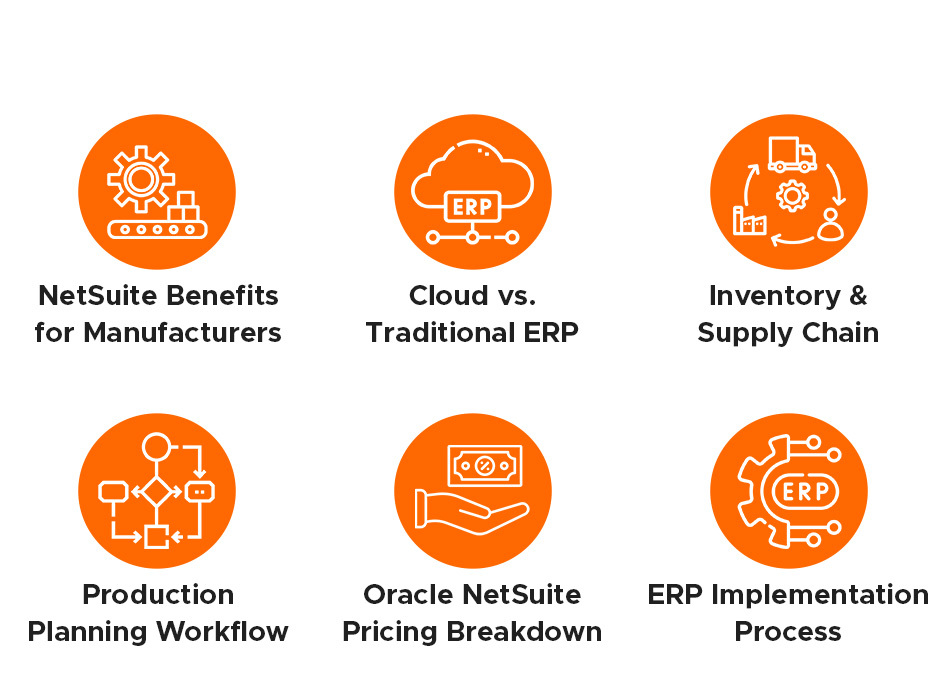
One of the biggest challenges manufacturers face is inventory control. NetSuite Advanced Manufacturing enables real-time tracking of raw materials, work-in-progress (WIP), and finished goods. This ensures that businesses maintain optimal inventory levels, reducing waste and preventing stockouts.
With NetSuite’s powerful production scheduling tools, manufacturers can efficiently plan their operations. It helps in:
NetSuite integrates financial data with manufacturing processes, providing a 360-degree view of your business. You can track costs, revenue, and profitability in real-time, making financial reporting seamless and accurate.
Ensuring product quality and meeting industry regulations is critical for manufacturers. NetSuite provides built-in quality control measures, compliance tracking, and audit-ready reporting to ensure your business remains compliant with industry standards.
A robust CRM system within NetSuite allows manufacturers to manage customer relationships effectively. It helps in tracking orders, managing warranties, and improving customer satisfaction through better communication and service.
Unlike traditional on-premise ERP systems, NetSuite is cloud-based, allowing remote access from anywhere. This makes it highly scalable and cost-effective, especially for growing businesses.
Many generic ERP solutions fail to meet the unique demands of manufacturing companies. NetSuite offers industry-specific functionalities tailored to meet the needs of manufacturers, including process automation and real-time analytics.
Implementation can make or break an ERP solution. Fortunately, businesses can leverage experienced NetSuite implementation partners to ensure a smooth transition. These experts provide customization, training, and ongoing support to maximize NetSuite’s potential.
Small manufacturers often struggle with outdated systems and manual processes. NetSuite for small business manufacturers offers an affordable and scalable ERP solution, eliminating the need for multiple disconnected tools. With its cloud-based infrastructure, even small businesses can enjoy enterprise-level efficiency without heavy IT investments.
When considering NetSuite, cost is always a key factor. Oracle NetSuite pricing varies based on several factors, including the number of users, modules required, and implementation complexity. While NetSuite may seem like a significant investment initially, its long-term benefits in efficiency, cost savings, and scalability make it well worth the price.
Selecting the right ERP system is just the first step—proper implementation is crucial. This is where we, at SoftArt, come in. As trusted Oracle consulting services providers and NetSuite partners, we specialize in helping manufacturers seamlessly transition to NetSuite. Our team offers:
The manufacturing industry is evolving rapidly, and staying ahead requires the right technology. NetSuite for manufacturing companies offers a comprehensive, cloud-based solution to streamline operations, reduce costs, and drive efficiency.
At SoftArt, we help businesses unlock the full potential of NetSuite. Whether you need assistance with implementation, customization, or ongoing support, our team of experts is here to guide you every step of the way.
Ready to take your manufacturing business to the next level? Contact SoftArt today and let’s discuss how NetSuite can work for you.
What is NetSuite for manufacturing companies?
Ans. NetSuite is a cloud-based ERP solution designed to streamline manufacturing operations, including inventory management, production planning, and financials.
How does NetSuite Advanced Manufacturing help?
Ans. It automates workflows, optimizes production schedules, and provides real-time visibility into supply chain and inventory.
Is NetSuite suitable for small manufacturing businesses?
Ans. Yes, NetSuite for small business manufacturers offers scalable, cost-effective solutions tailored to growing companies.
How much does Oracle NetSuite cost?
Ans. Oracle NetSuite pricing varies based on business size, required modules, and implementation scope.
Why choose NetSuite over other ERP solutions?
Ans. It’s cloud-based, scalable, and offers industry-specific customization with seamless financial and operational integration.
Can NetSuite be customized for my business needs?
Ans. Yes, with the help of NetSuite implementation partners, businesses can customize NetSuite for their specific manufacturing requirements.
In an ever-evolving landscape where success is determined by efficiency and precision, businesses worldwide are on a quest for tools that can improve decision-making, optimize operations, and improve workflows. The Oracle NetSuite platform has evolved through this revolutionary advancement of AI capabilities, ushering in a new era in business operations by operating smarter and providing for business needs. Now, this expansion with Next Gen includes next-level automation, predictive analytics, and intelligent assistance that will change how organizations use technology to grow.
AI is doing much more than just automating NetSuite; it is transforming the way businesses operate at every level. AI-driven tools within NetSuite streamline tasks such as financial management and customer engagement, minimizing errors and giving businesses real-time insights.
By doing so, NetSuite extends AI’s capabilities to streamline processes, allowing companies to concentrate on strategic projects rather than performing mindless operational processes. This probably comes as good news for expanding businesses that need to adopt more intelligent solutions to scale faster and smarter.
Oracle NetSuite Debuts AI-Powered Features for Workflow Automation & Decision Making. Oracle NetSuite has announced a host of AI features that enhance workflow automation and accuracy in data and business decisions. Let us look at the most effective NetSuite AI features:
Top 3 Benefits The Future Of Working With AI Can Bring; AI Content Generation NetSuite Text Enhanceenables businesses to generate and polish content in-app. This AI tool makes sure that the content generated is relevant, context-aware, and business communication optimized. Whether writing emails, reports, or marketing content, this feature helps you to work and makes your work more efficient with 100% accuracy.
The Prompt Management API enables developers and administrators to integrate AI capabilities throughout their NetSuite environment. This allows businesses to govern such prompts effectively without worrying about any underlying technological complexities.
The pricing of complex products can be tedious and error-prone. The integration of AI-driven automation through the NetSuite AI Assistant for CPQ (Configure, Price, Quote) addresses this complexity by streamlining the process of creating accurate price quotes. This enables sales teams to deliver fast, accurate responses to customers, decreasing delays and improving customer experience.
Navigating NetSuite’s vast capabilities can sometimes be overwhelming. The NetSuite AI Assistant within Suite Answers helps users find the information they need quickly. By using AI-powered search capabilities, users receive relevant answers to their queries, reducing the time spent troubleshooting and increasing productivity.
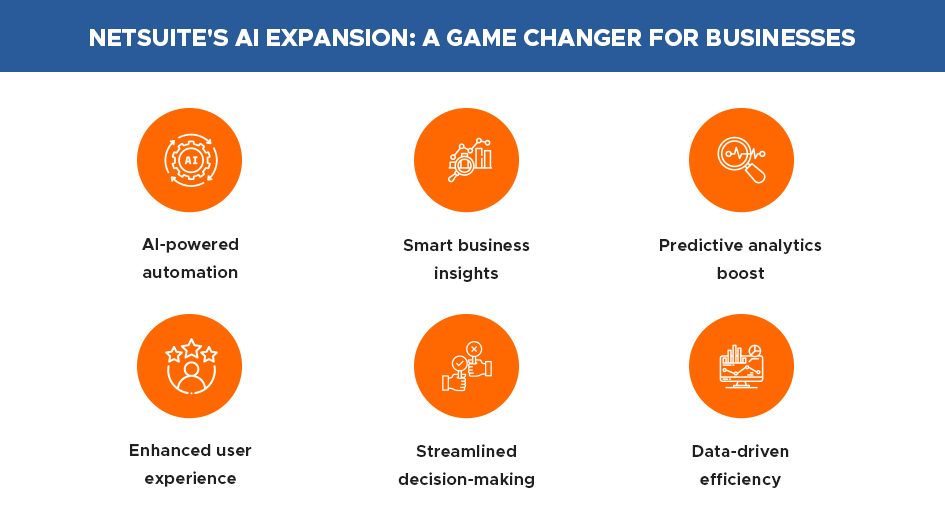
Automation eliminates manual processes, allowing teams to focus on high-value tasks. AI-powered tools reduce repetitive workloads, ensuring teams can allocate their time and resources more effectively.
With AI analyzing vast amounts of data in real-time, businesses gain actionable insights that drive better decision-making. This reduces human error, enhances reporting accuracy, and ensures that financial and operational decisions are based on reliable data.
AI-driven personalization enhances customer experiences by providing tailored responses and recommendations. Whether through AI-generated content or automated customer service responses, businesses can maintain engagement without added workload.
By automating routine tasks, businesses reduce operational costs while improving scalability. AI ensures that NetSuite grows with the business, adapting to increased demands without requiring additional manpower.
To fully leverage these AI innovations, businesses need expert guidance and implementation. As a trusted NetSuite implementation partner, SoftArt specializes in helping organizations optimize NetSuite’s AI-driven features. Our comprehensive services ensure that businesses can make the most of these enhancements.
Choosing the right NetSuite licensing options is crucial for maximizing value. SoftArt provides expert consultation to help businesses select the best NetSuite licensing models that align with their needs and budgets.
Our experienced team ensures a smooth transition to NetSuite for small businesses and enterprises alike. From initial setup to customization, we handle all aspects of NetSuite implementation, ensuring a hassle-free experience.
There can be the complexity of integrating the Net Suite AI features with existing systems up to October 2023. SoftArt focuses on NetSuite integration so that all application environments can work with AI, making it more efficient.
We’re a committed provider of NetSuite support, and as such, we provide ongoing support, system optimizations, and AI customizations to help businesses adapt to evolving needs.
AI in NetSuite will only continue to grow, with existing improvements and new features that will increase agility in various aspects of your business. Some possibilities for the future of AI in NetSuite:
Companies that take these AI developments and run with them will be ahead of others, which needs to happen to increase efficiency, profitability, and consumer experience.
As NetSuite expands its AI capabilities, businesses have the opportunity to revolutionize their operations like never before. However, expert implementation is key to unlocking these benefits. SoftArt is here to guide you through the transition to AI-powered NetSuite solutions. With expertise in Oracle consulting, AI-driven integrations, and NetSuite implementation, we ensure your business is future-ready.
Don’t just keep up—lead the way. Connect with SoftArt today to discover how our tailored NetSuite support solutions can transform your business!
What are the new AI capabilities in NetSuite?
Ans. NetSuite has expanded its AI features to enhance automation, predictive analytics, and intelligent recommendations for businesses.
How does Artificial Intelligence in NetSuite improve efficiency?
Ans. AI in NetSuite streamlines operations, automates repetitive tasks, and provides real-time insights to help businesses make data-driven decisions.
Can small businesses benefit from NetSuite AI features?
Ans. Yes, NetSuite for small business includes AI-driven automation, helping small companies optimize workflows and enhance productivity.
What is the role of the NetSuite AI Assistant?
Ans. NetSuite AI Assistant helps users with intelligent suggestions, automated reporting, and data-driven decision-making for better business management.
Do I need NetSuite partners for AI implementation?
Ans. Working with NetSuite implementation partners ensures seamless AI integration, customization, and ongoing NetSuite support for optimal performance.
How does SoftArt help with NetSuite AI adoption?
Ans. SoftArt provides Oracle consulting services, helping businesses implement and optimize NetSuite AI features for maximum efficiency.
Managing manufacturing operations involves multiple complexities—from inventory control and production scheduling to financial management and customer service. To stay competitive and efficient, manufacturers need robust solutions that streamline processes and improve decision-making. NetSuite for manufacturing has emerged as a game-changer by providing a unified platform to handle all aspects of manufacturing operations. In this blog, we will explore the key benefits of NetSuite for manufacturers and how SoftArt can help you harness its potential for growth and efficiency.
NetSuite is a cloud-based Enterprise Resource Planning (ERP) system that integrates essential manufacturing functions under a single platform. Unlike traditional systems that require multiple software applications to manage operations, NetSuite for manufacturers offers a comprehensive solution that covers everything from production planning and shop floor management to financials and customer relationship management (CRM).
SoftArt, an authorized Oracle NetSuite solution provider, specializes in helping manufacturing companies leverage NetSuite’s capabilities for operational excellence.
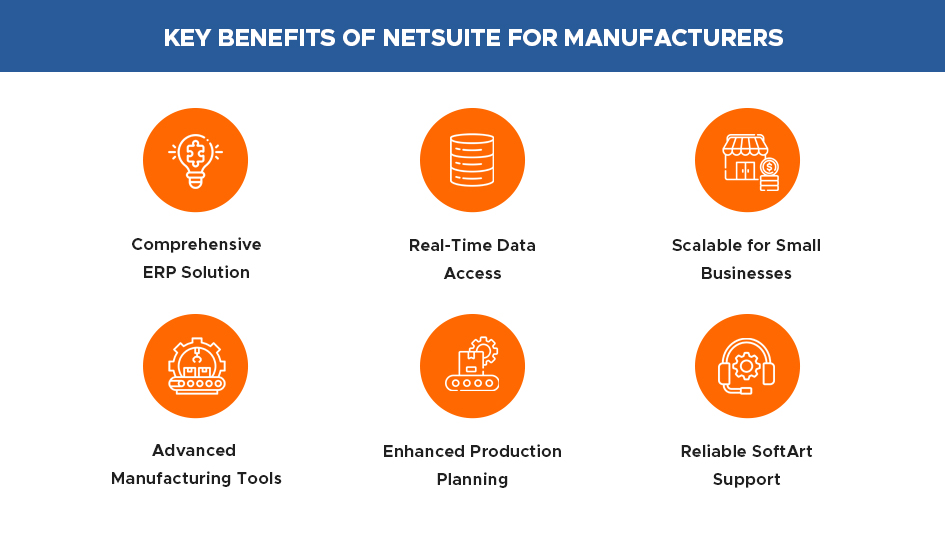
NetSuite provides manufacturers with real-time insights into every aspect of their business, including inventory levels, production schedules, and financial performance. This visibility allows manufacturers to make informed decisions and respond quickly to market demands.
One of the primary challenges in manufacturing is maintaining optimal inventory levels. NetSuite Advanced Manufacturing offers robust inventory management features that help you track stock levels, automate reordering processes, and reduce carrying costs.
With NetSuite for manufacturing, you can optimize production schedules and resource allocation. The system provides tools for shop floor control, capacity planning, and work order management, enabling manufacturers to meet production targets efficiently.
NetSuite integrates financial management with manufacturing operations, providing a unified view of costs, revenues, and profitability. This integration helps manufacturers manage budgets, forecast financial performance, and ensure compliance with accounting standards.
As your manufacturing business grows, NetSuite can scale to meet your evolving needs. Its cloud-based architecture allows for seamless updates and integration with other systems, ensuring that your operations remain agile and responsive.
With integrated CRM capabilities, NetSuite helps manufacturers improve customer service by providing a 360-degree view of customer interactions, order histories, and support tickets. This data enables personalized service and faster issue resolution.
NetSuite’s robust reporting and analytics capabilities empower manufacturers to make data-driven decisions. Customizable dashboards and real-time reports provide insights that drive operational improvements and strategic planning.
By automating manual processes and reducing the need for multiple software applications, NetSuite helps manufacturers achieve significant cost savings. The system’s comprehensive features improve operational efficiency and reduce errors.
SoftArt provides end-to-end NetSuite support and implementation services to ensure that manufacturers get the most out of their ERP investment. As a trusted NetSuite partners, we offer customized solutions tailored to the unique needs of manufacturing businesses.
For small and mid-sized manufacturing businesses, adopting a robust ERP system like NetSuite can be transformative. NetSuite for small business manufacturers provides the same powerful features as it does for larger enterprises but at a scale that fits their operations and budget.
Small businesses can benefit from:
As a leading NetSuite partners, SoftArt understands the unique challenges faced by manufacturers. Our expertise in oracle consulting services ensures that your ERP implementation aligns with your business goals and delivers measurable results.
We work closely with manufacturers to:
Investing in NetSuite for manufacturing offers a wide range of benefits, from enhanced operational efficiency to improved financial management and customer service. With the right implementation partner, manufacturers can unlock the full potential of this powerful ERP system.
SoftArt is here to help you navigate the complexities of ERP implementation and ensure that your manufacturing operations run smoothly and efficiently.
Contact SoftArt today to learn how our Oracle NetSuite solution provider services can help you achieve operational excellence. Our experts are ready to guide you through every step of your NetSuite journey and ensure your business reaches new heights.
What is NetSuite for Manufacturing?
Ans. NetSuite for manufacturing is a comprehensive cloud-based ERP solution designed to streamline manufacturing operations, enhance production efficiency, and improve supply chain management.
What are the key benefits of using NetSuite for manufacturers?
Ans. Some key benefits include real-time visibility, streamlined operations, demand planning, and enhanced reporting capabilities.
How does NetSuite Advanced Manufacturing help manufacturers?
Ans. NetSuite Advanced Manufacturing offers specialized tools for shop floor management, work order tracking, and production scheduling.
Is NetSuite suitable for small manufacturing businesses?
Ans. Yes, NetSuite for small business manufacturers provides scalable solutions that help manage operations efficiently without the need for heavy infrastructure investment.
Why should manufacturers choose SoftArt for NetSuite solutions?
Ans. SoftArt provides expert implementation, Oracle consulting services, and ongoing support, helping manufacturers maximize the benefits of NetSuite.
What types of support does SoftArt offer for NetSuite?
Ans. SoftArt offers NetSuite support, customization, and consulting services to ensure businesses get the most out of their ERP system.
In the highly competitive world of eCommerce success is not just about selling products but it is about creating seamless and unforgettable shopping experiences. Customers today expect fast, intuitive and personalized interactions at every step of their journey. Meeting these expectations means finding a platform that does not just support operations but elevates your business.
Thats where NetSuite SuiteCommerce takes the lead which is a powerful solution designed to streamline your eCommerce operations and deliver exceptional customer experiences. From real time inventory management to seamless integrations eCommerce with NetSuite provides you with the tools you need to stay ahead in the digital marketplace. NetSuite combines flexibility, functionality and scalability to match your unique needs whether you are a startup or a large enterprise.
This guide highlights the key benefits of NetSuite, itsintegration and features showcasing why it is a game-changer for businesses aiming to thrive in the competitive online retail space. Read on to uncover how NetSuite can revolutionize your eCommerce strategy and help you achieve sustainable growth.
Staying ahead of competition involves more than just having a visually appealing website when managing an online store. From inventory management to customer relationship tracking the backend processes play an equally important role in gaining success. Here is how NetSuite SuiteCommerce addresses these challenges:
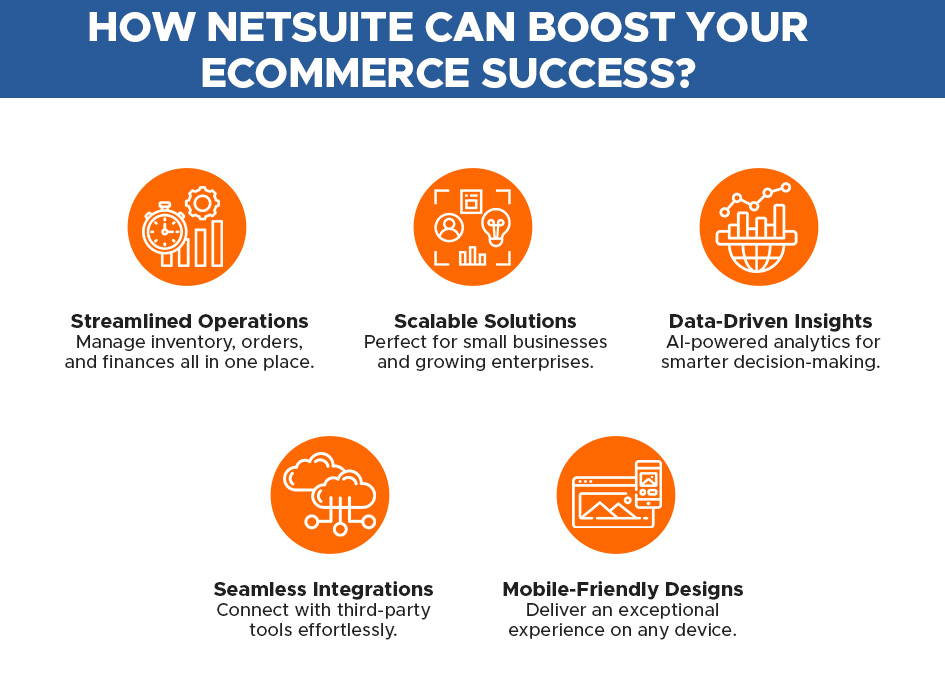
Integration is highly important for eCommerce success. As a trusted NetSuite integration firm, SoftArt enables you to seamlessly connect NetSuite with various systems to ensure smooth workflows. Here is how:
NetSuite for small business offers cost-effective solutions that simplify operations while delivering outstanding functionality. Key benefits include:
At SoftArt we bring over 20 years of experience in providing Oracle consulting services, migrations, implementations and 24/7 support. Here is why businesses trust us for their NetSuite integration services:
One of the most common concerns anyone has when adopting a new platform is cost. You must be wondering whether it is worth it or not. Then we must say that although the exact cost depends on the size and scope of your business, the efficiency improvements and revenue growth it drives make it a worthwhile and strategic choice for businesses of all sizes. Here are the key Advantages of Investing in NetSuite:
The eCommerce landscape is continuously evolving and staying competitive means adopting platforms that are future ready. NetSuite SuiteCommerce is designed to adapt to changing trends ensuring your business remains ahead of the curve. With AI-powered analytics, mobile-friendly designs, and seamless integrations, NetSuite is set to transform online retail.
Choosing the right eCommerce platform is one of the most important decisions a business can make. NetSuite simplifies operations, enhances customer experiences and scales effortlessly to meet your growing needs.
At SoftArt, we specialize in helping businesses unlock the full potential of NetSuite through expert NetSuite integration services. Whether you are a small business or a large enterprise our personalized solutions ensure you get the most out of your investment.
Take the first step towards transforming your online business. Let SoftArt and NetSuite for small business elevate your eCommerce experience today.